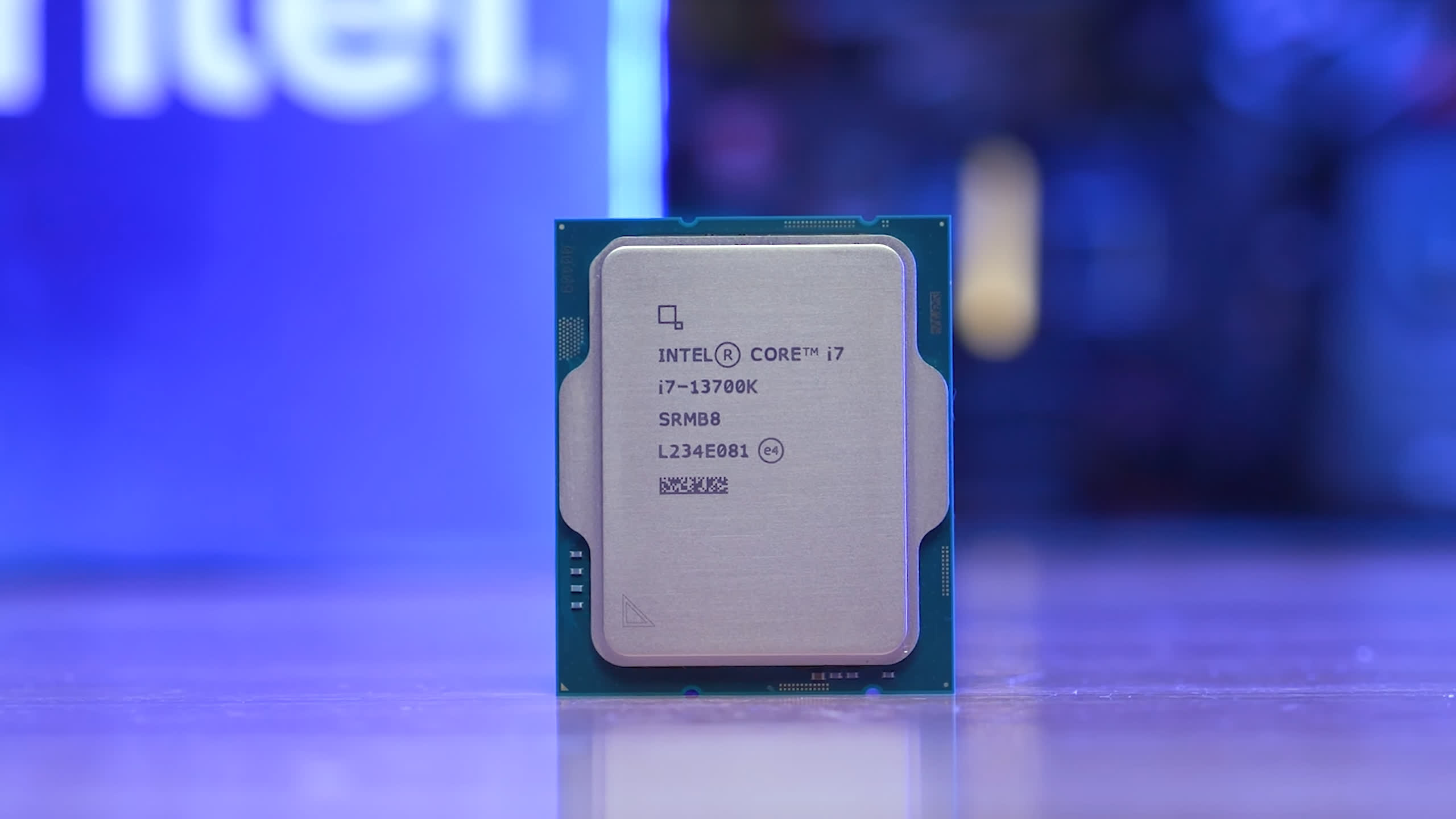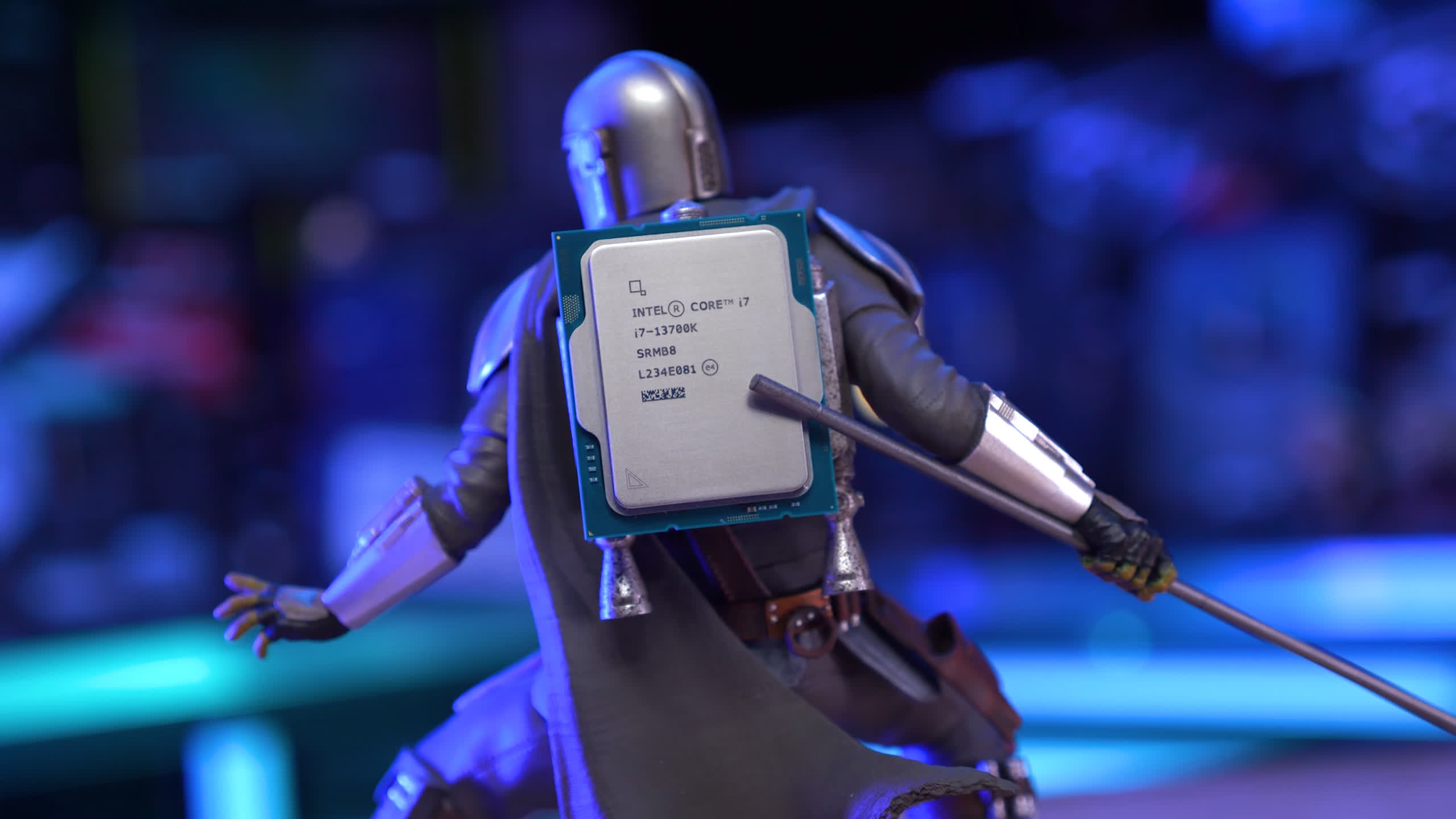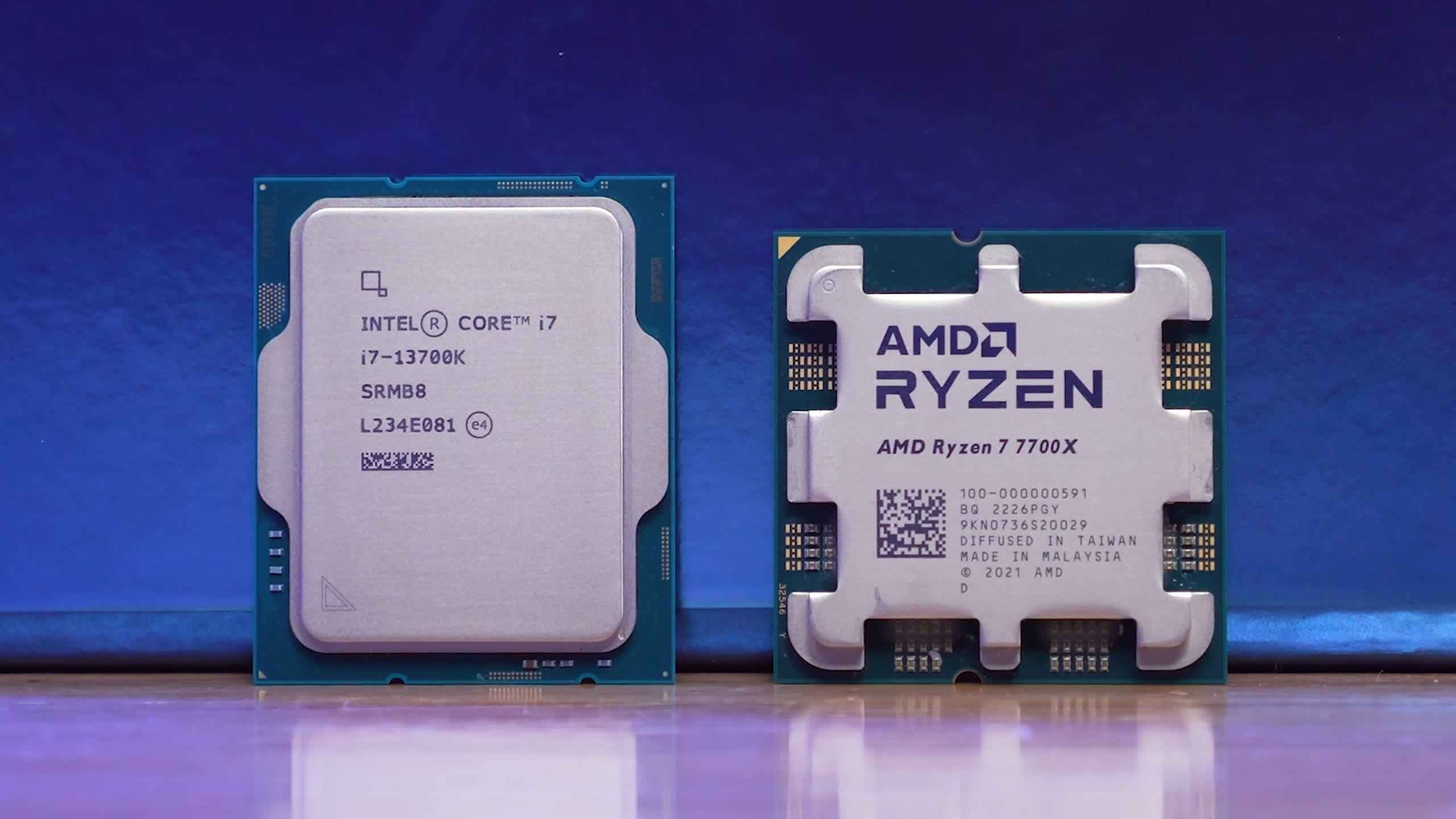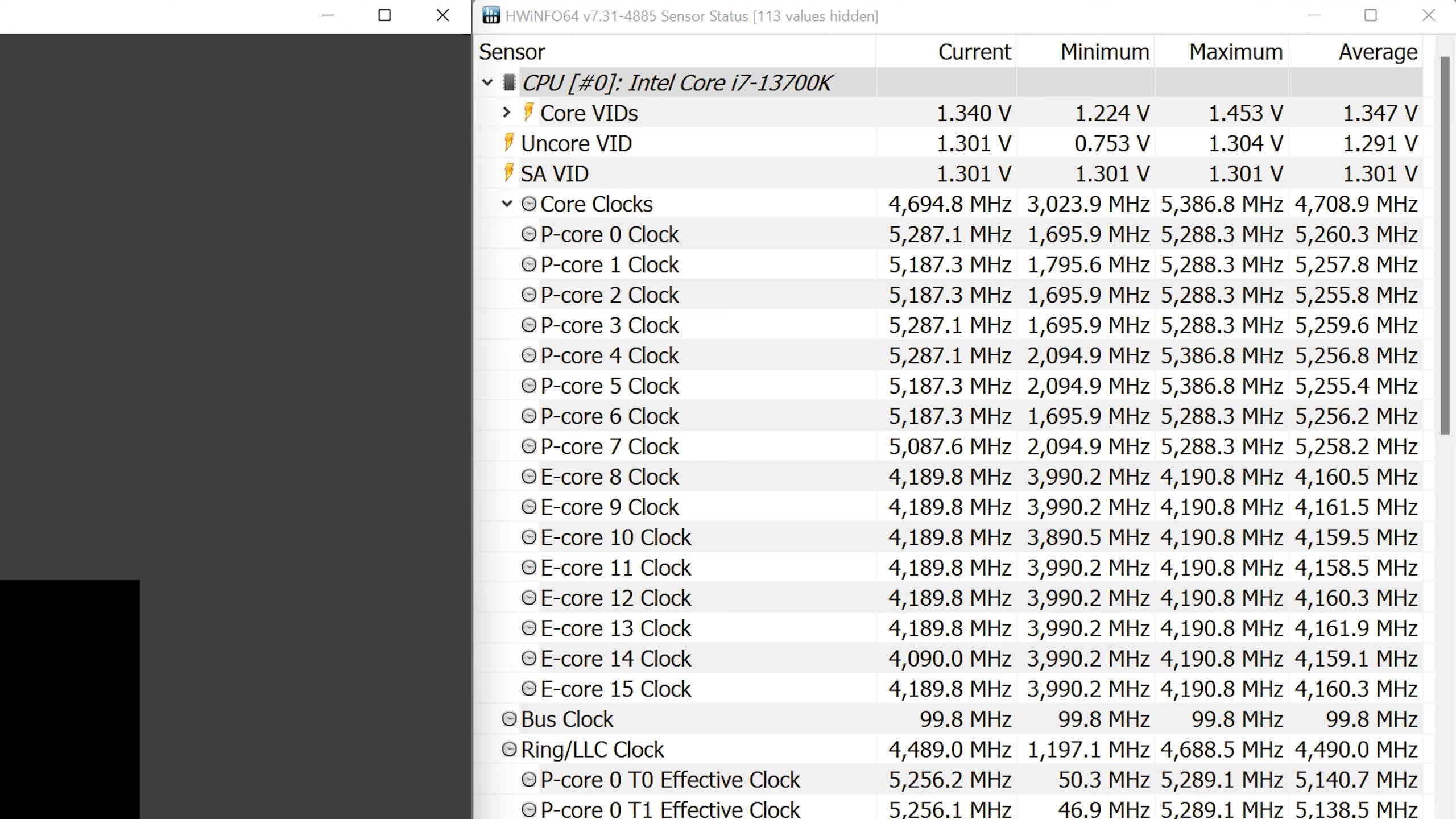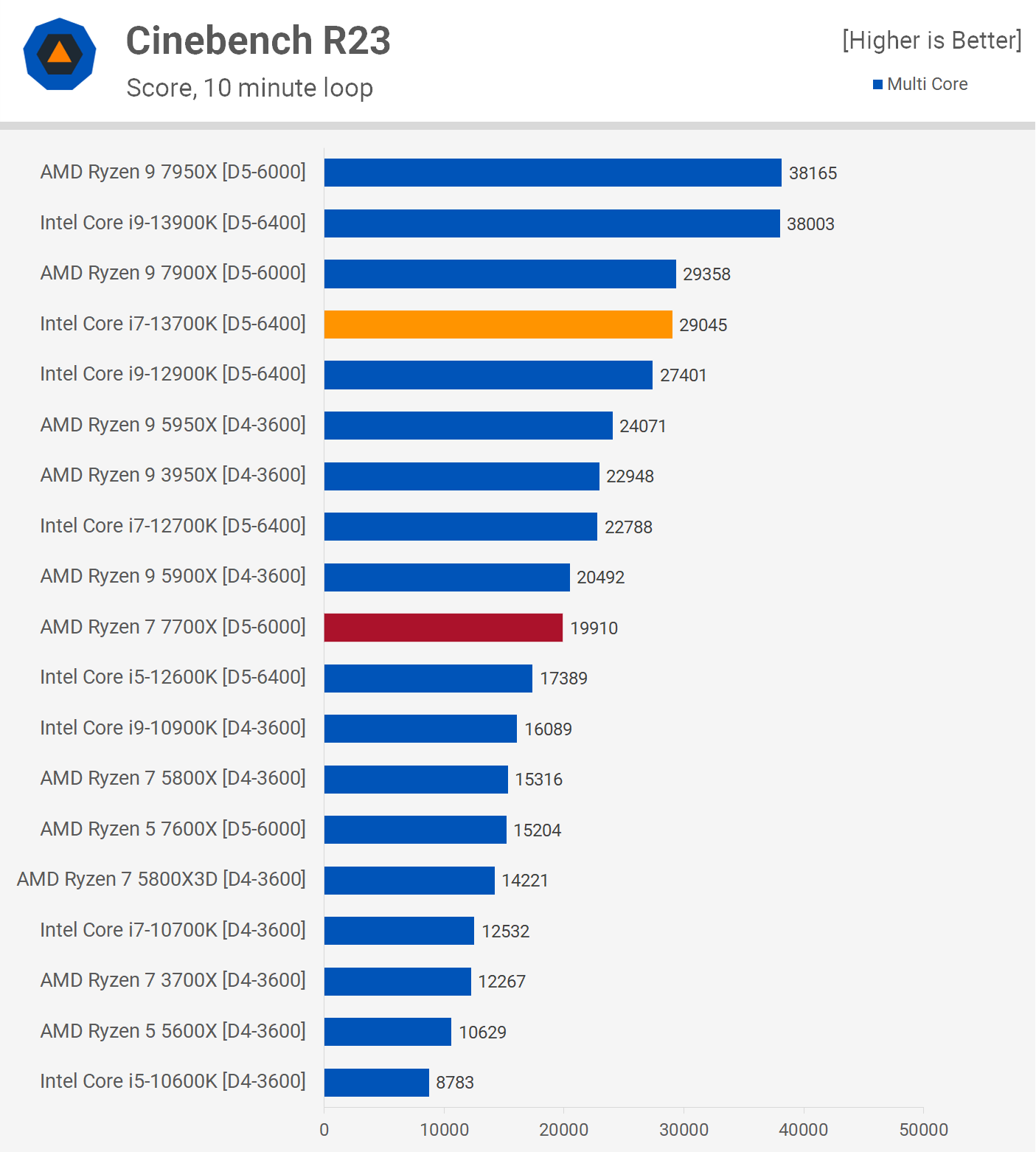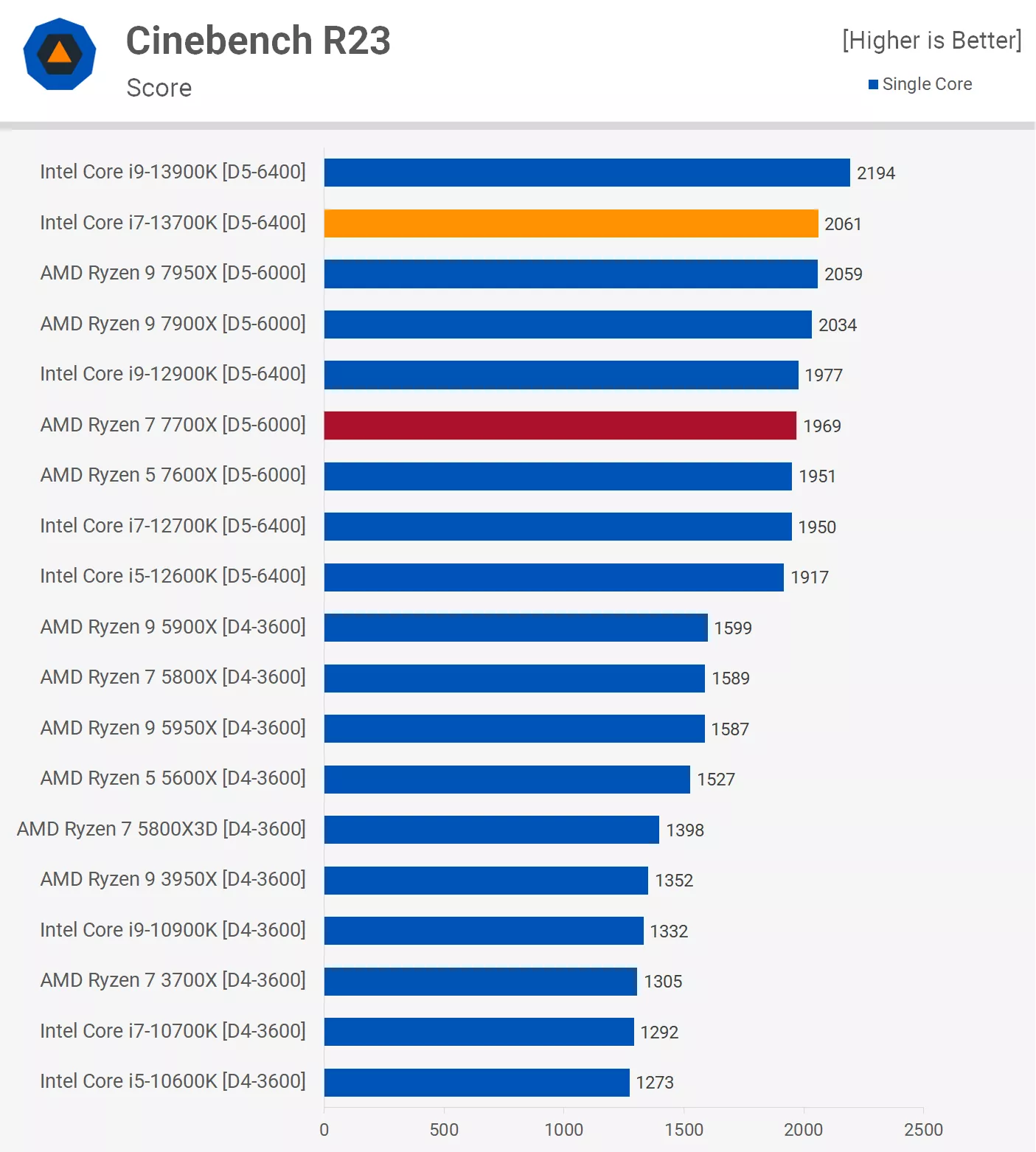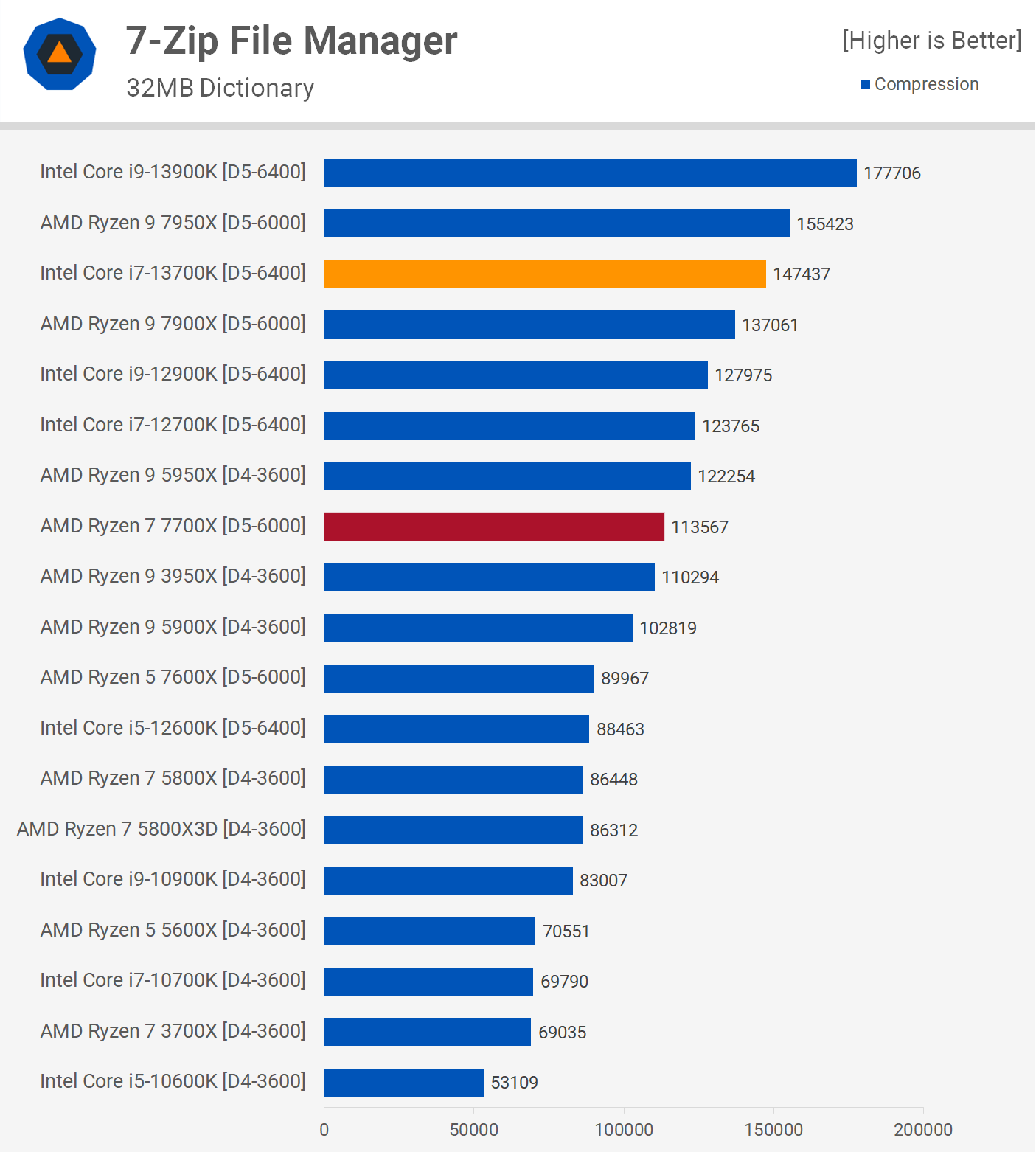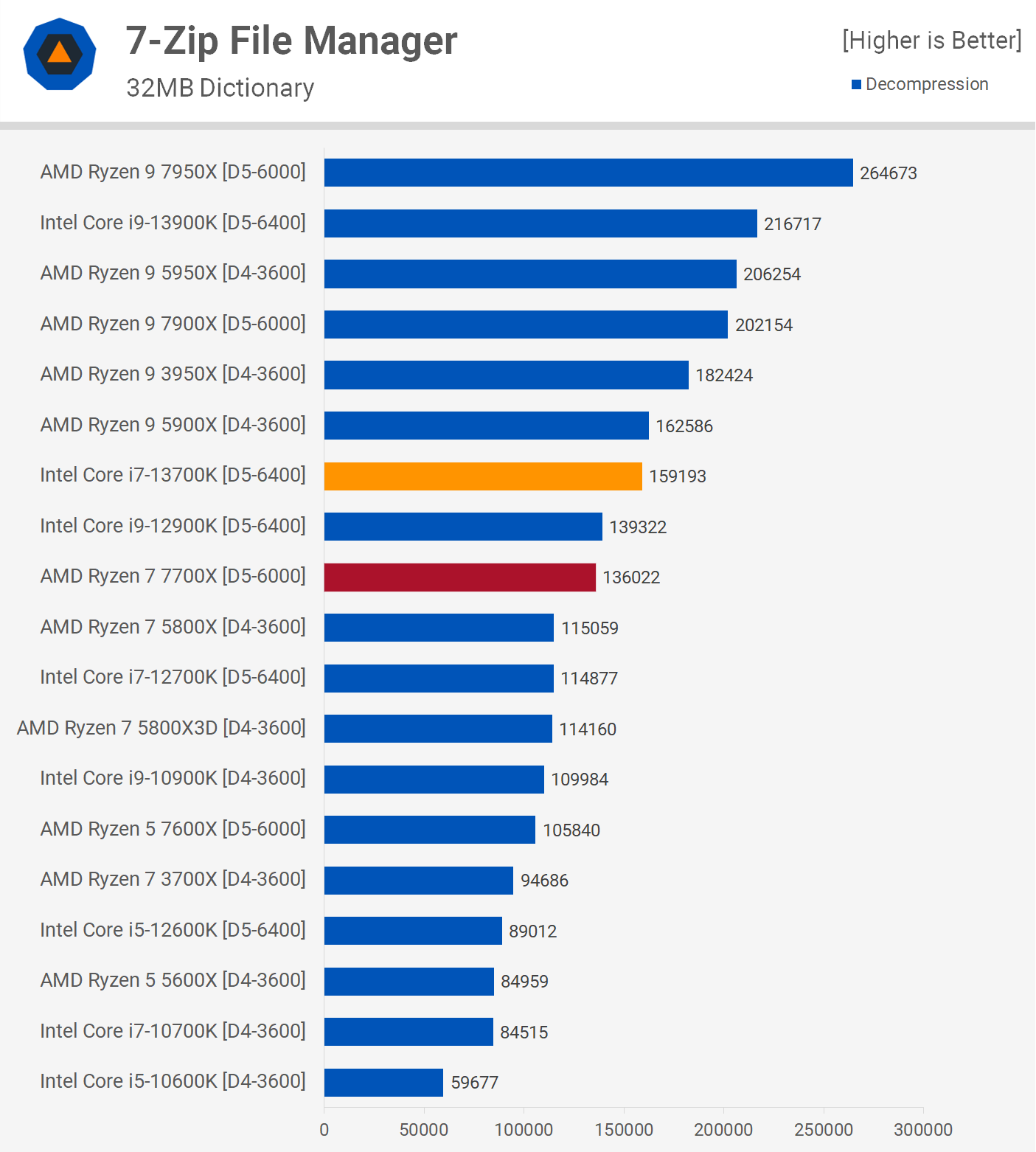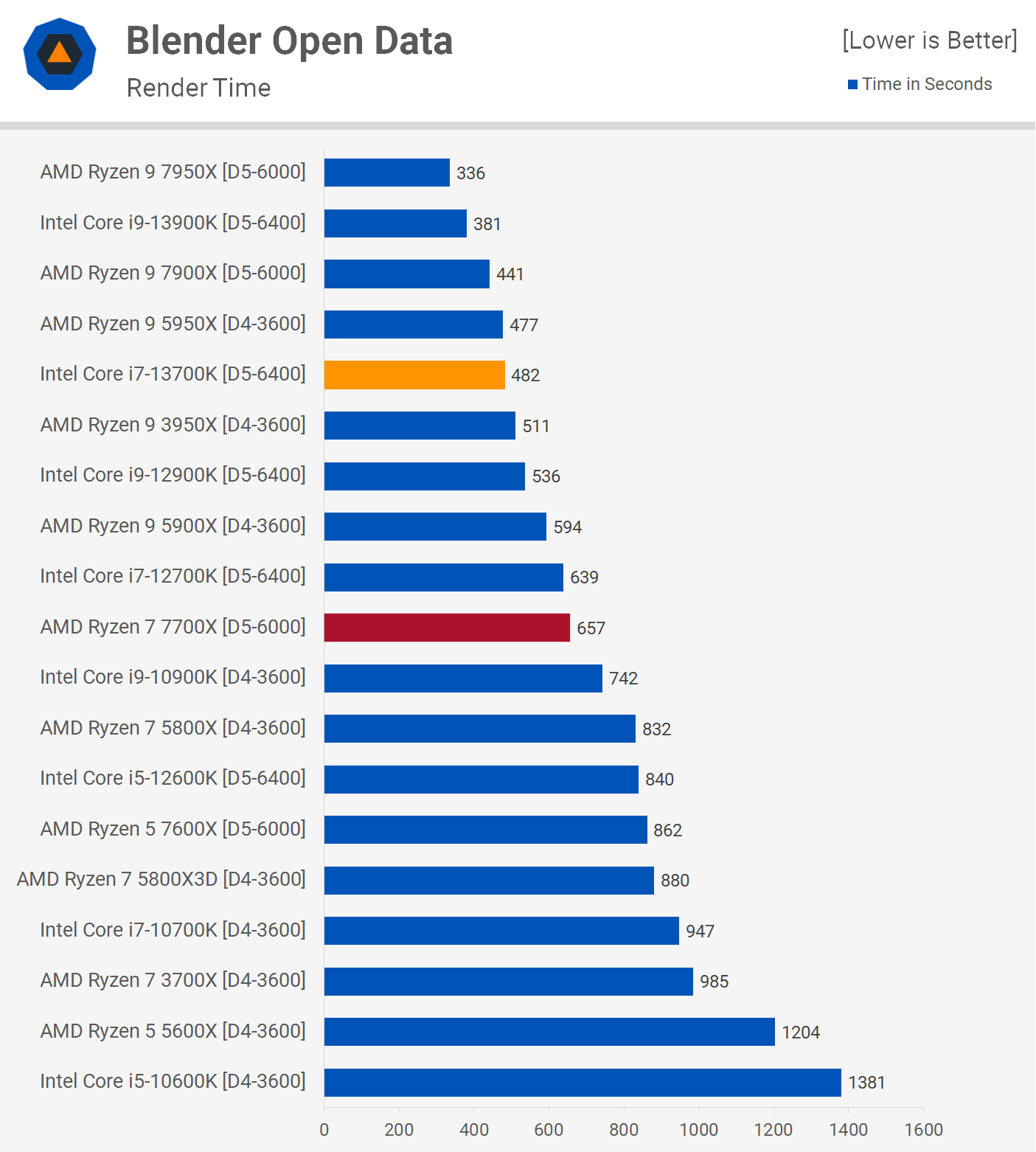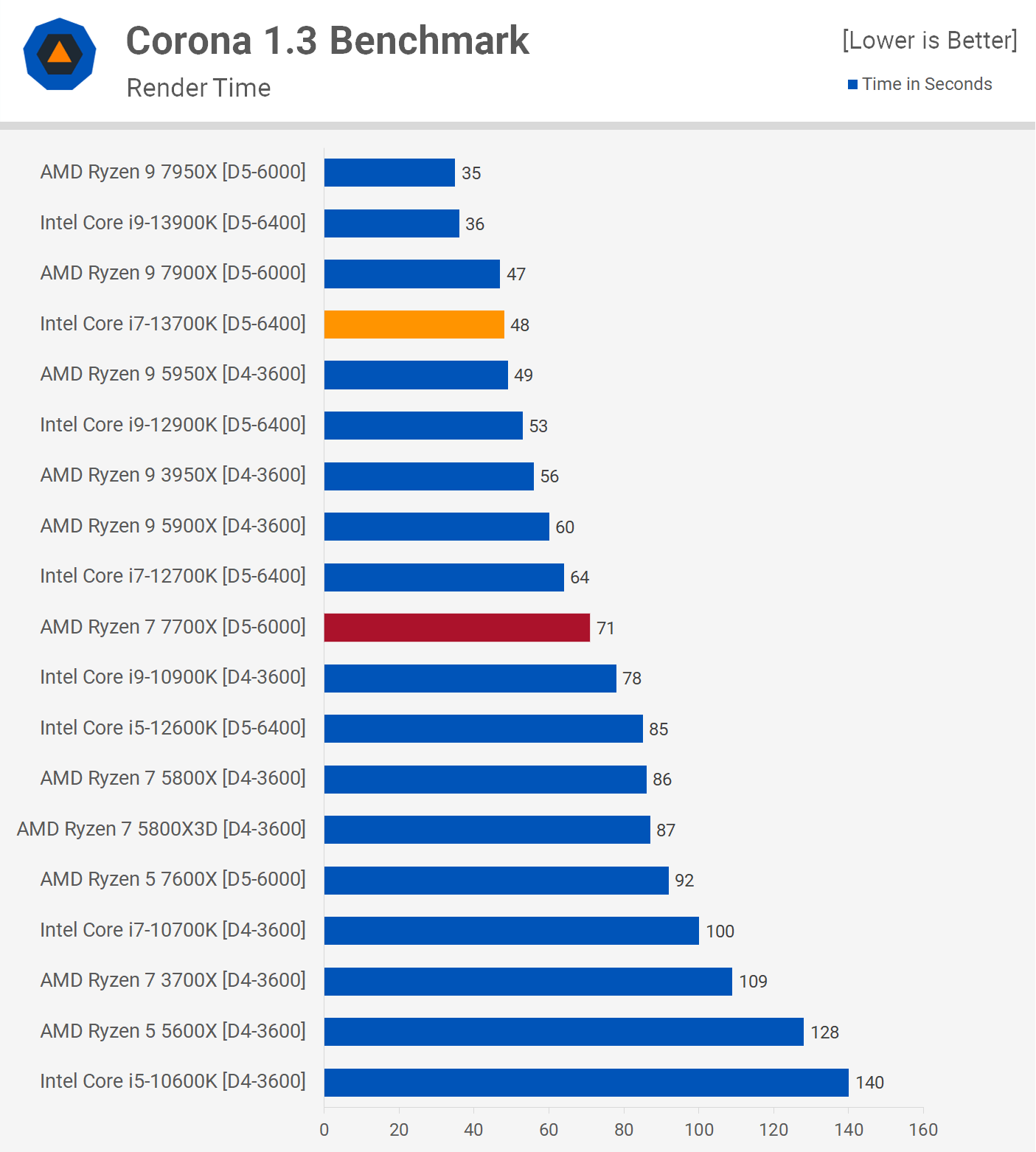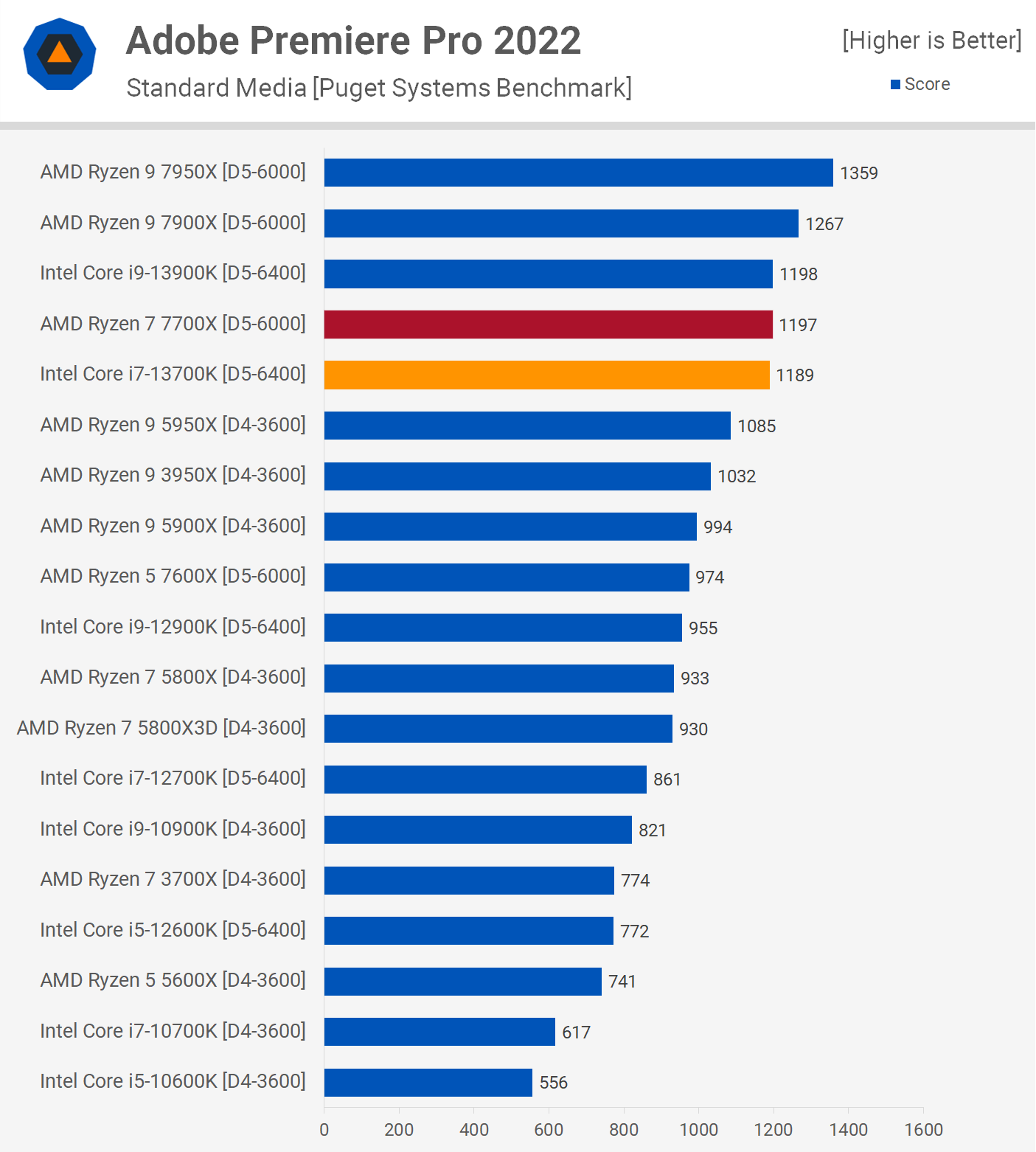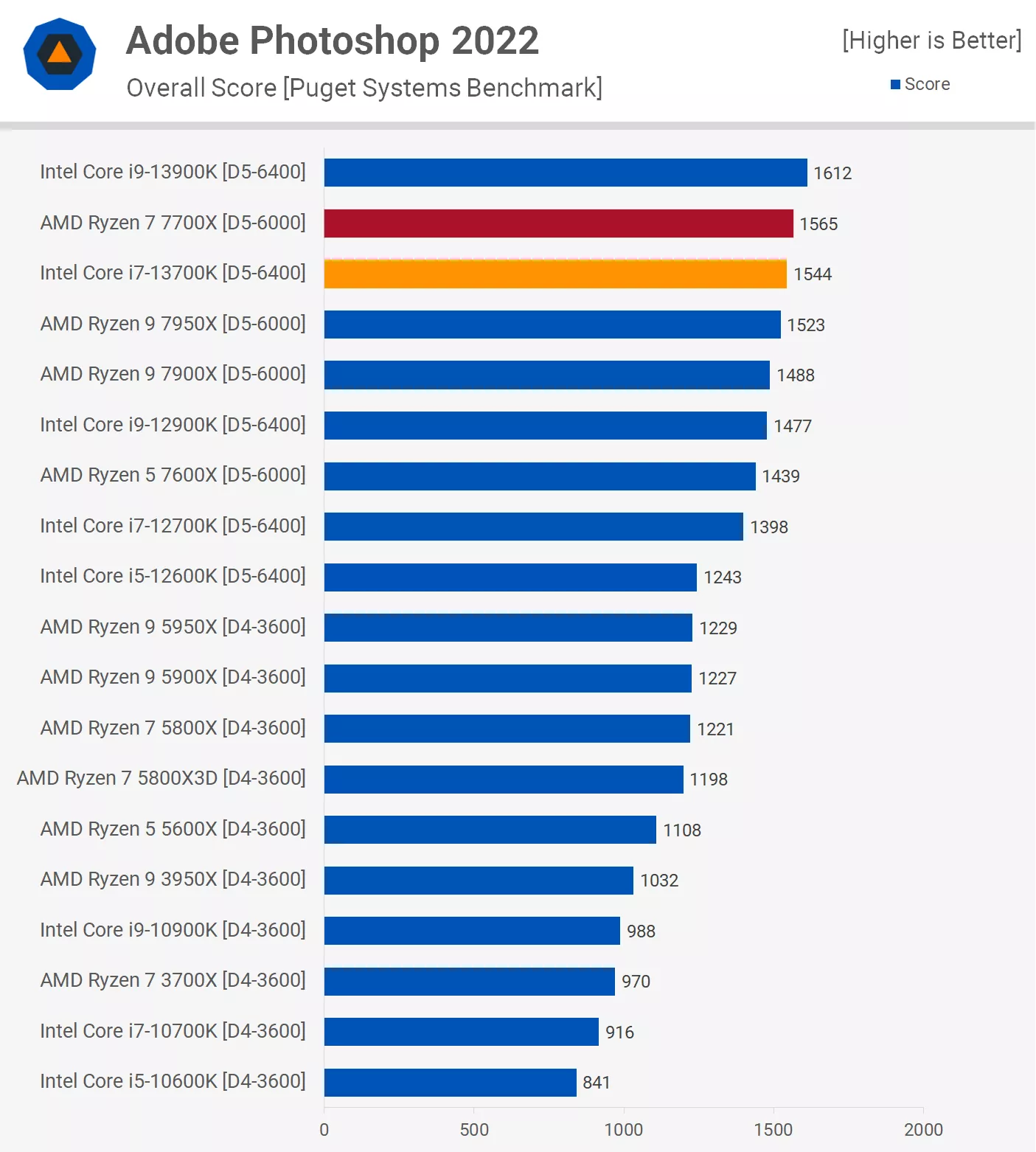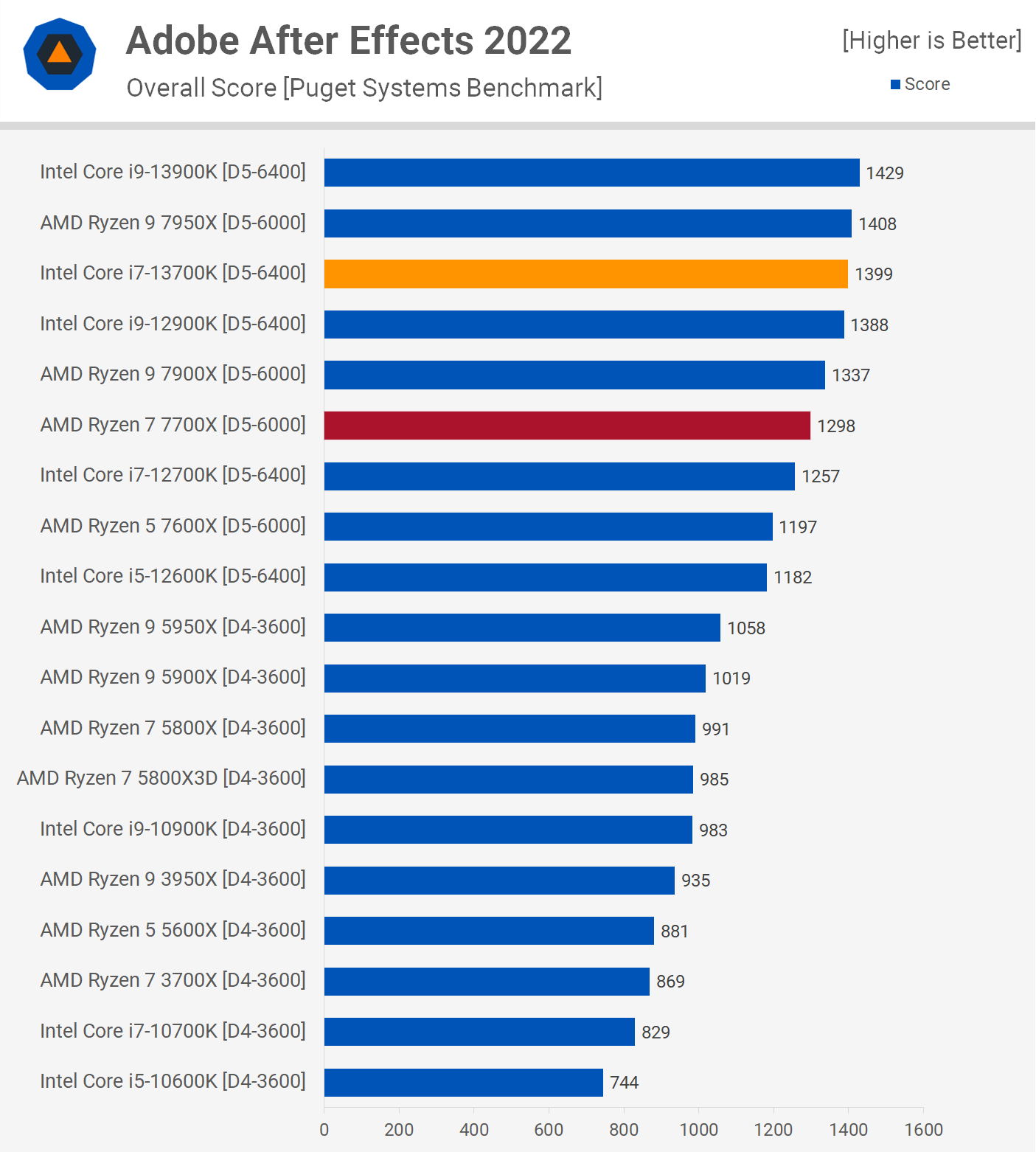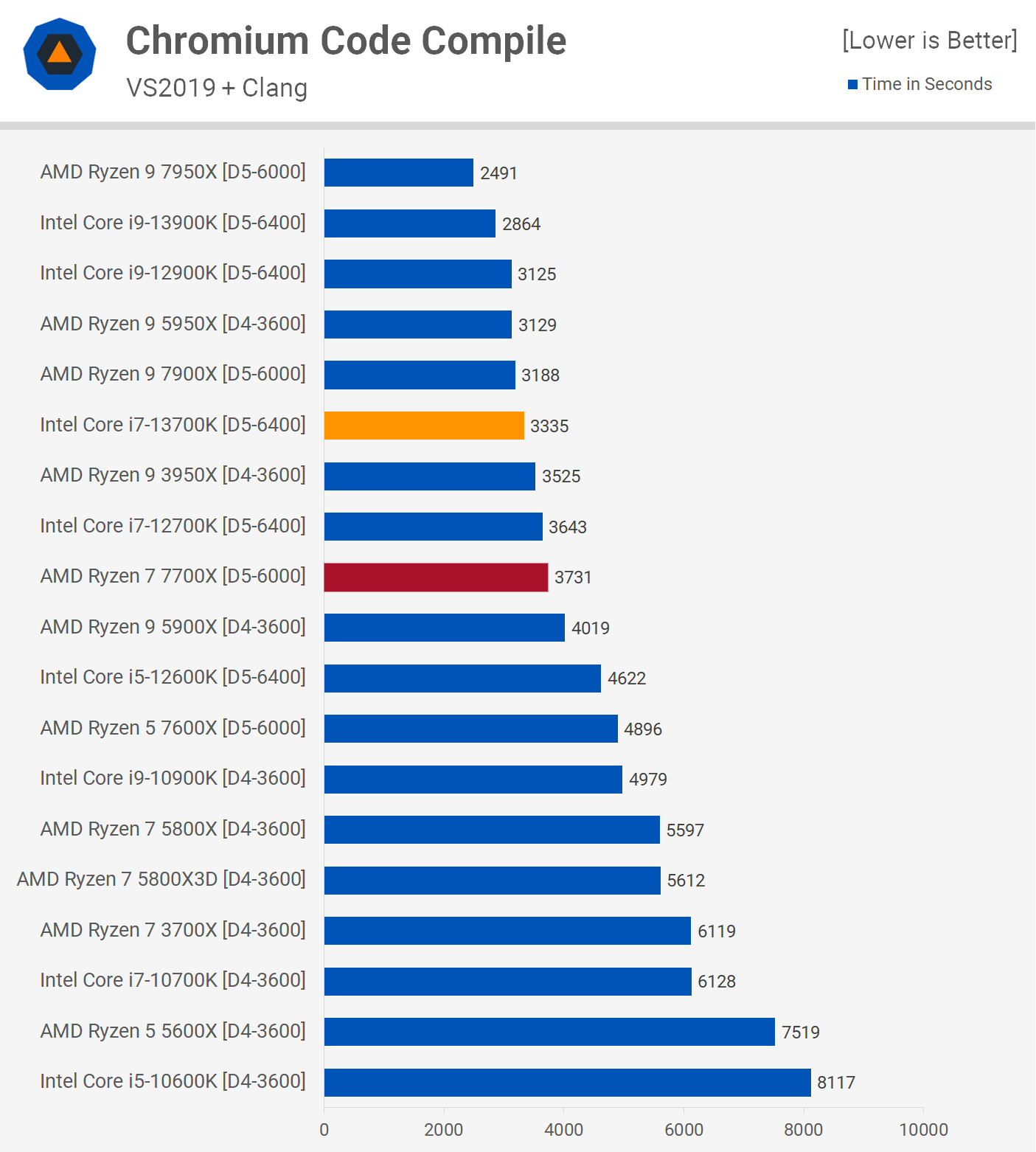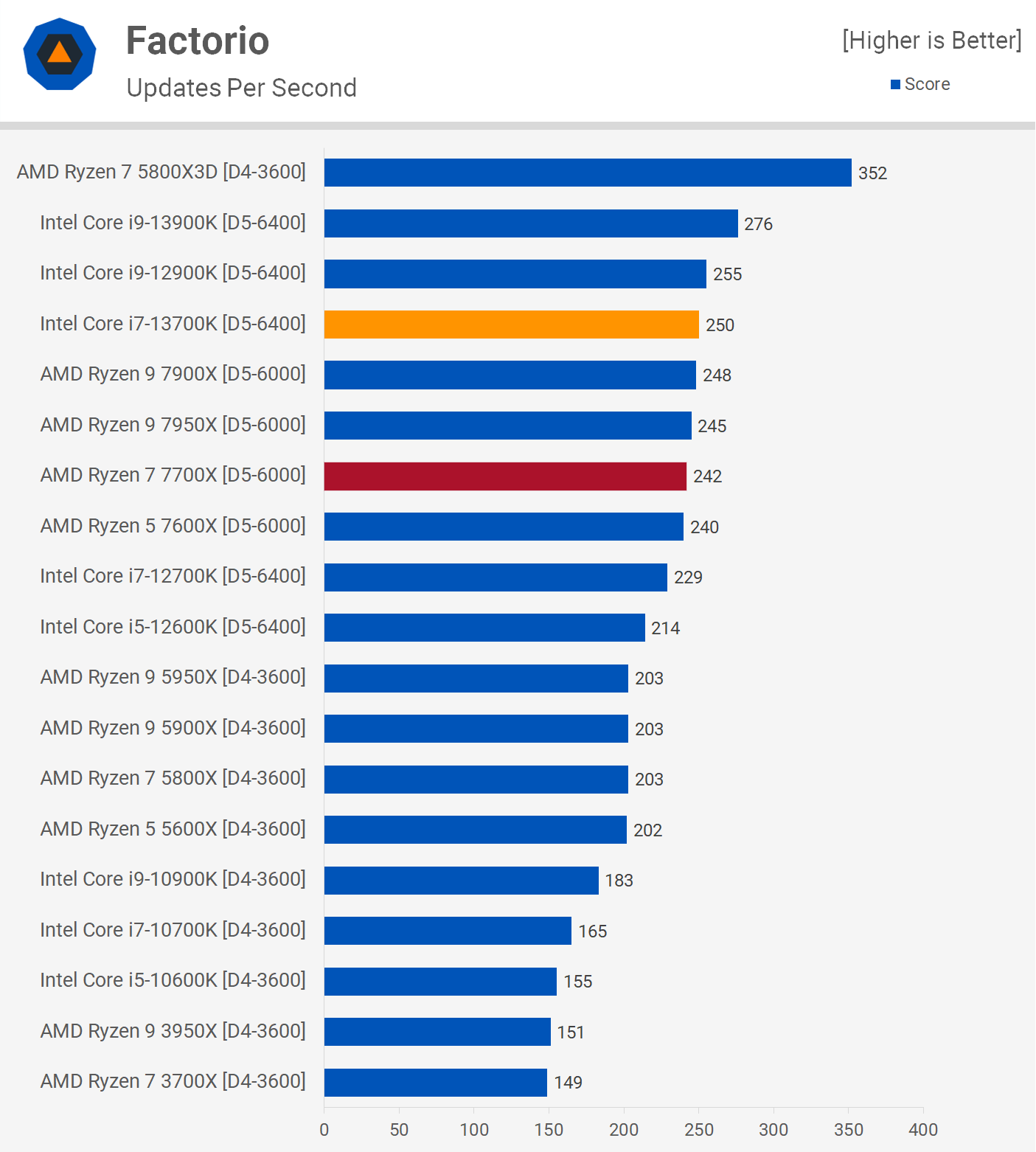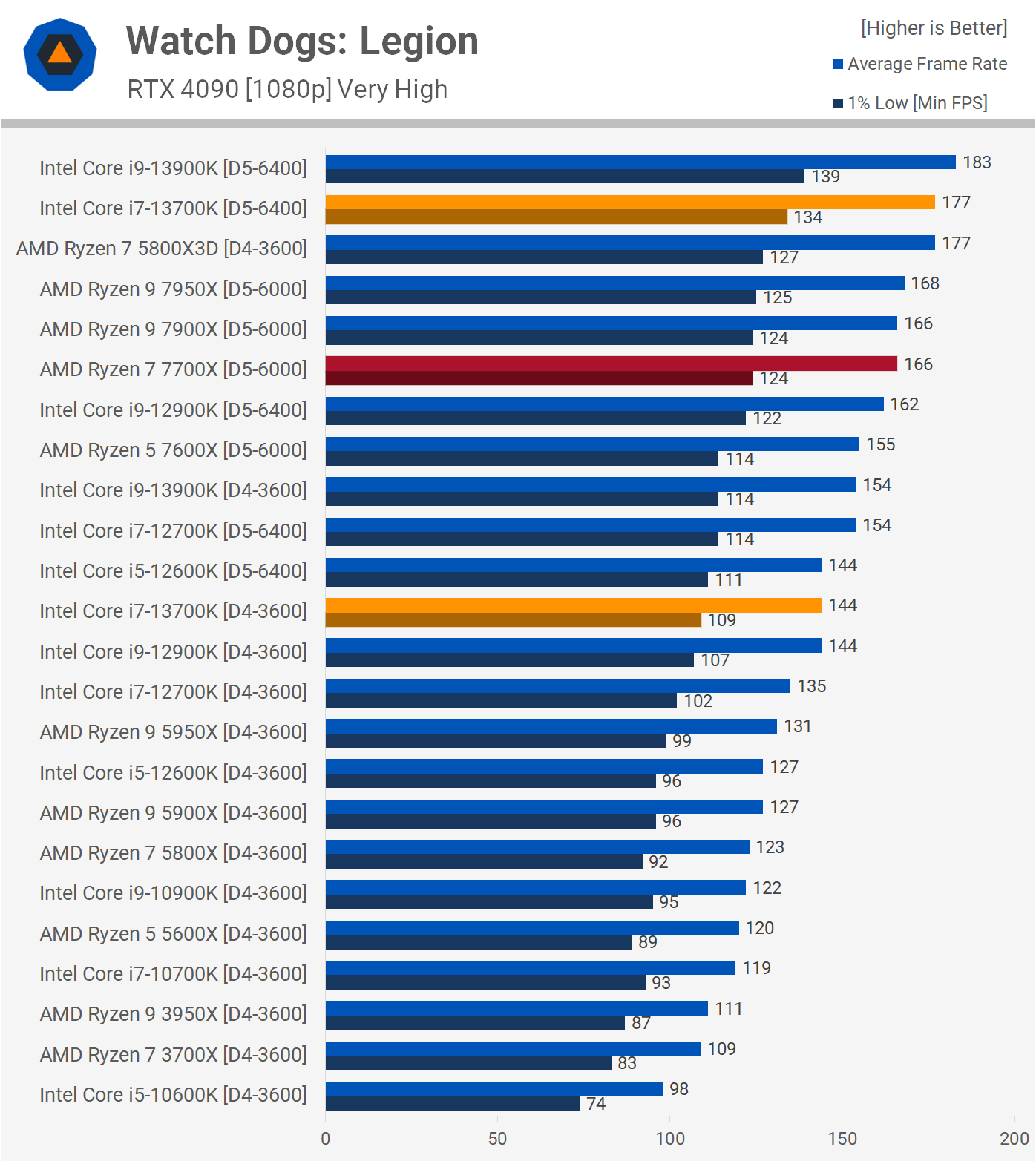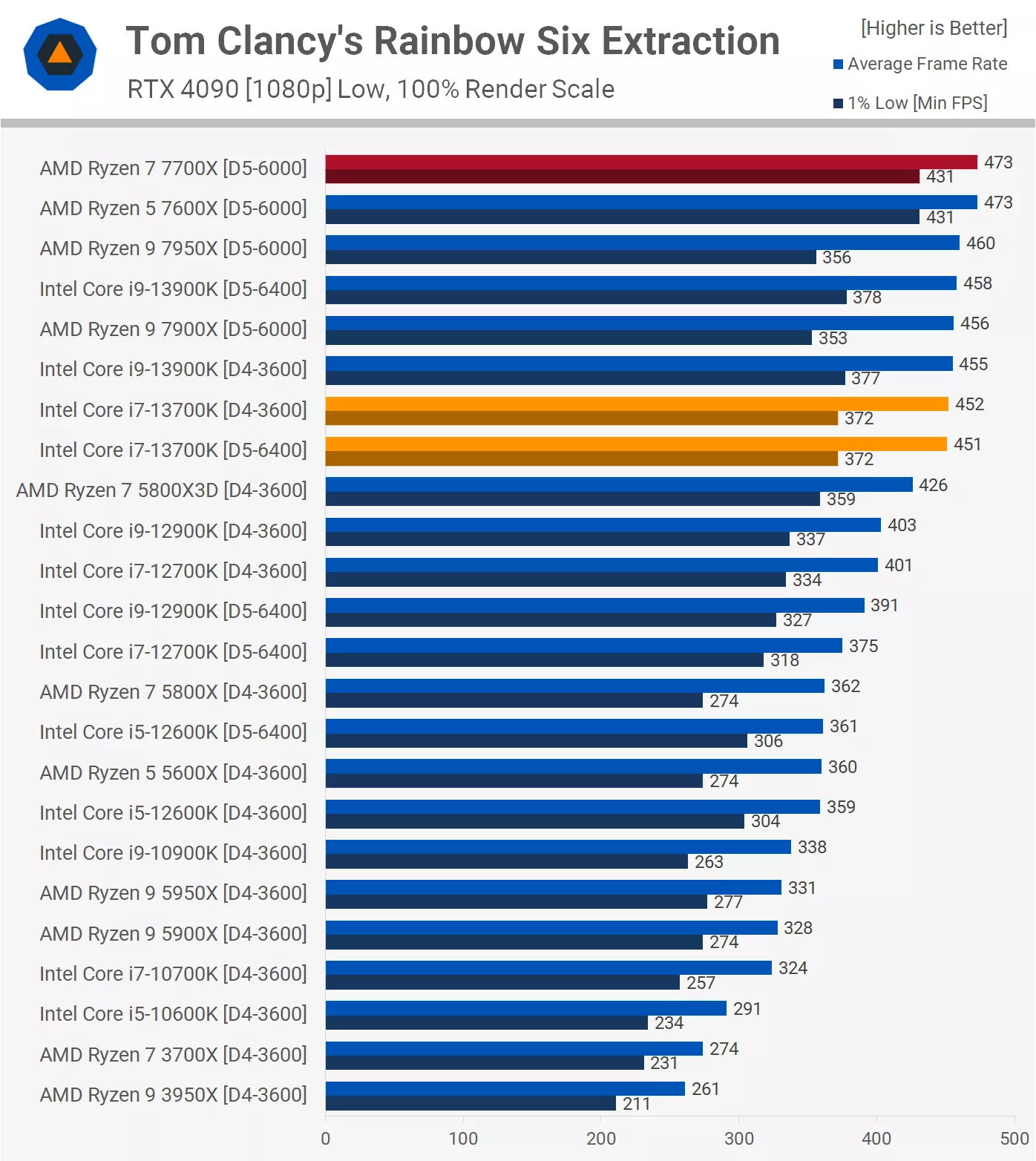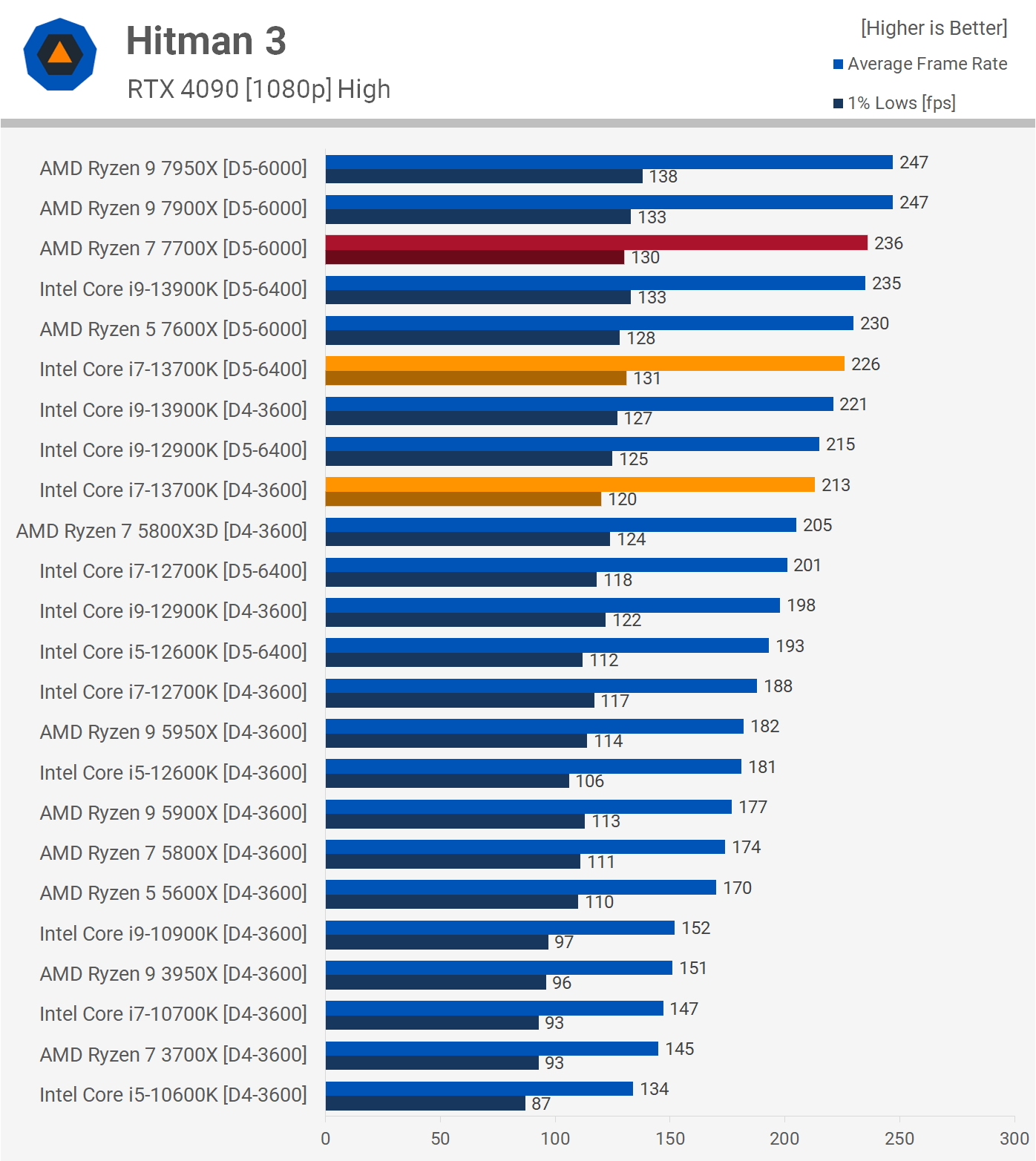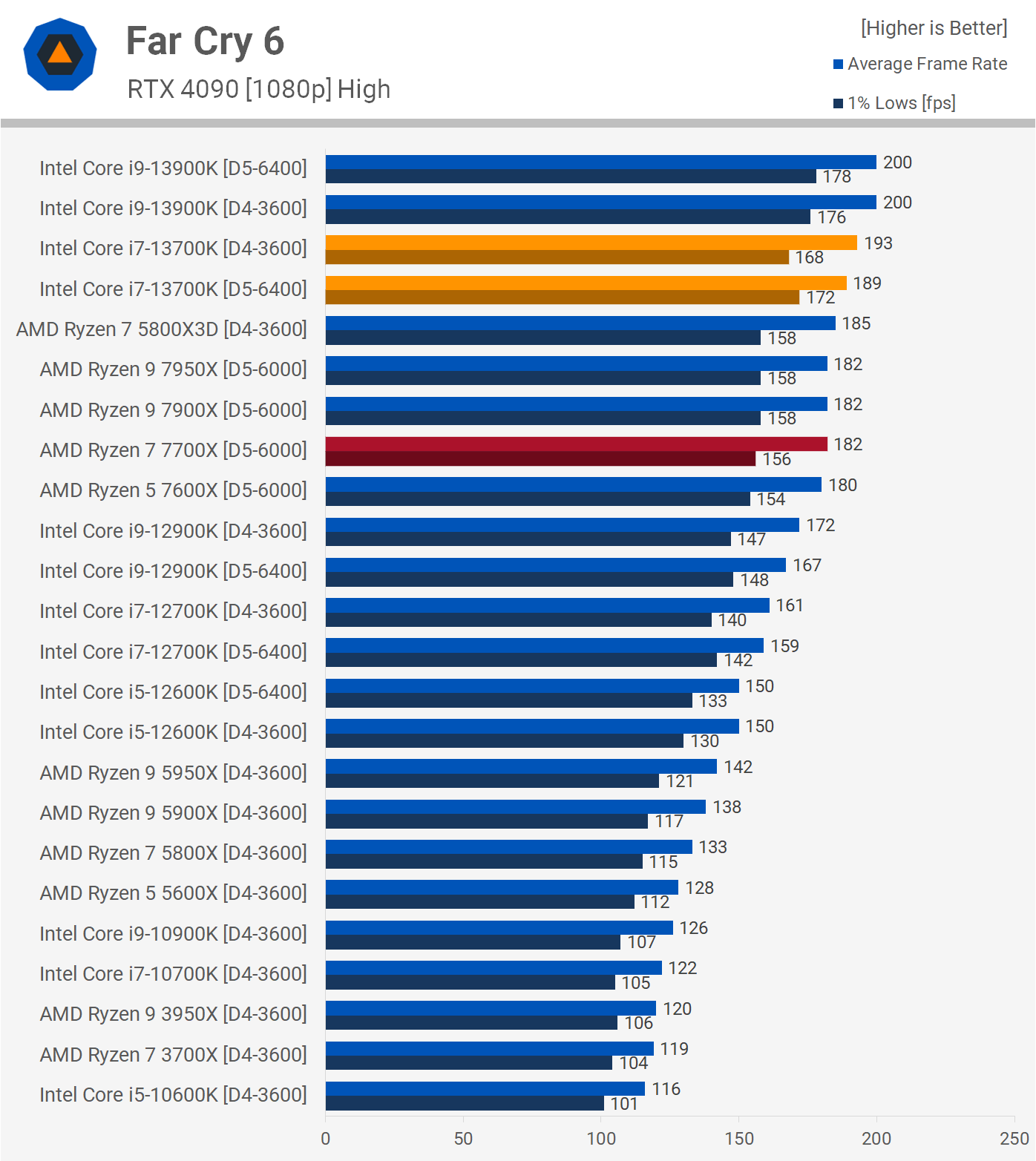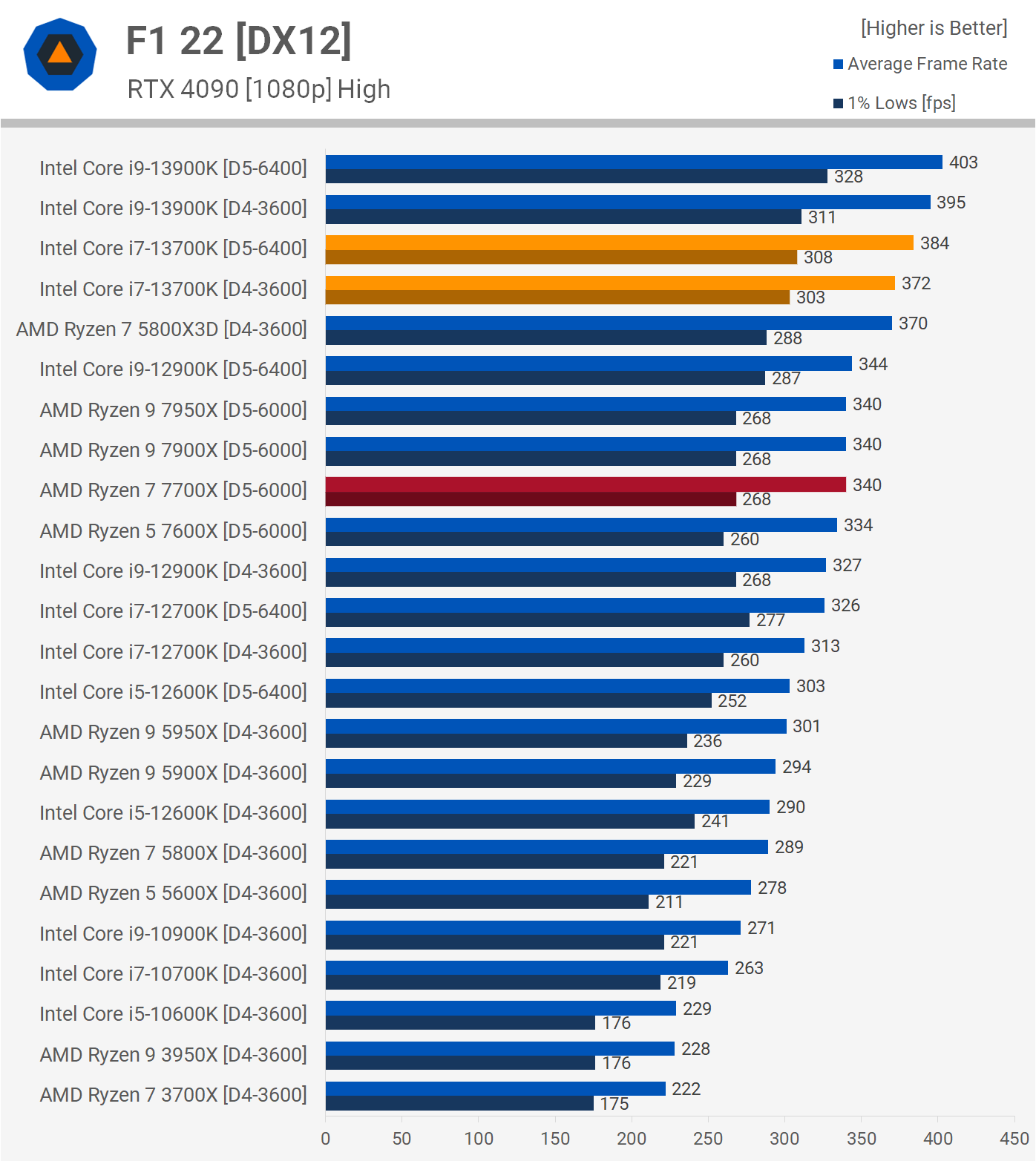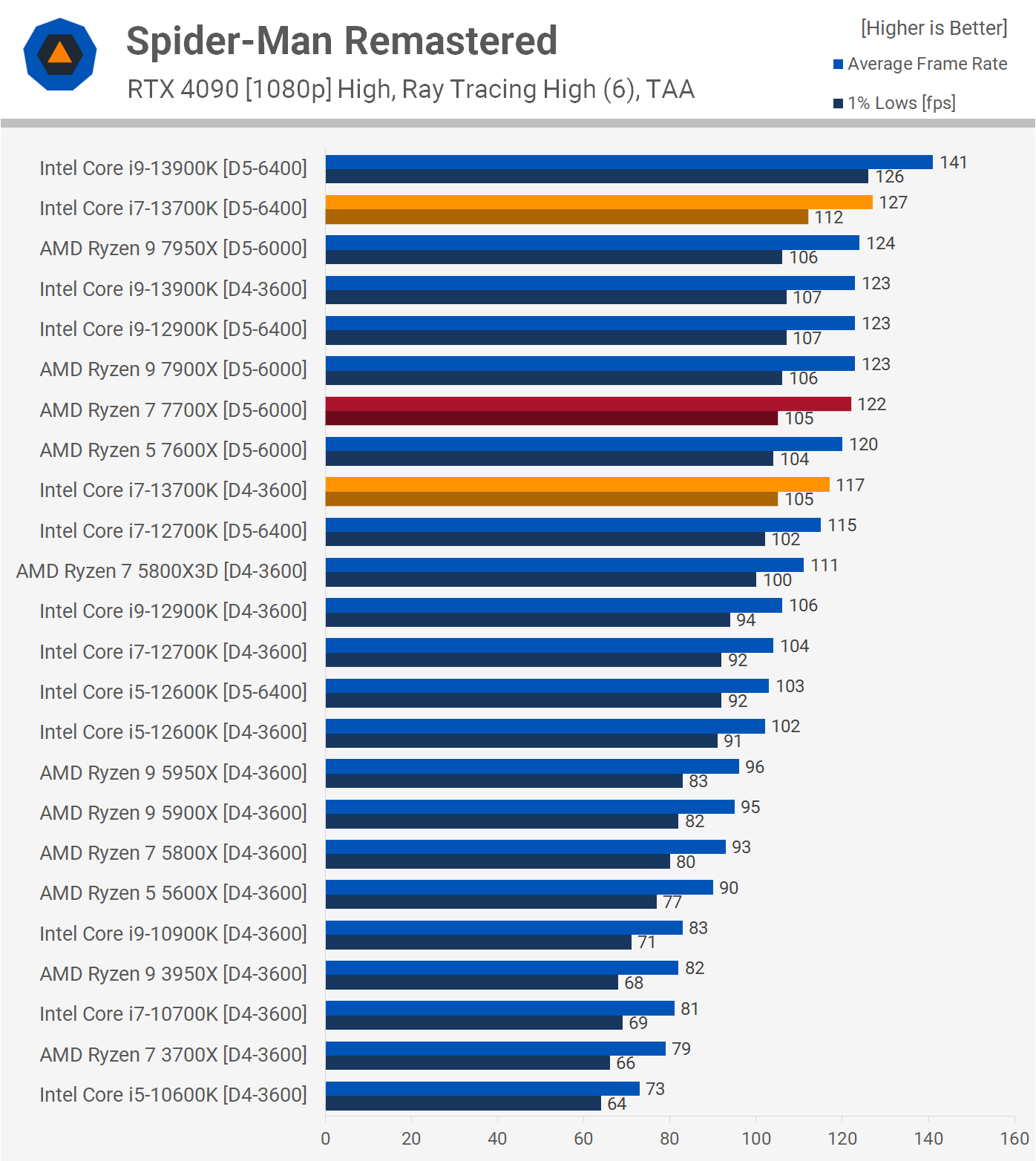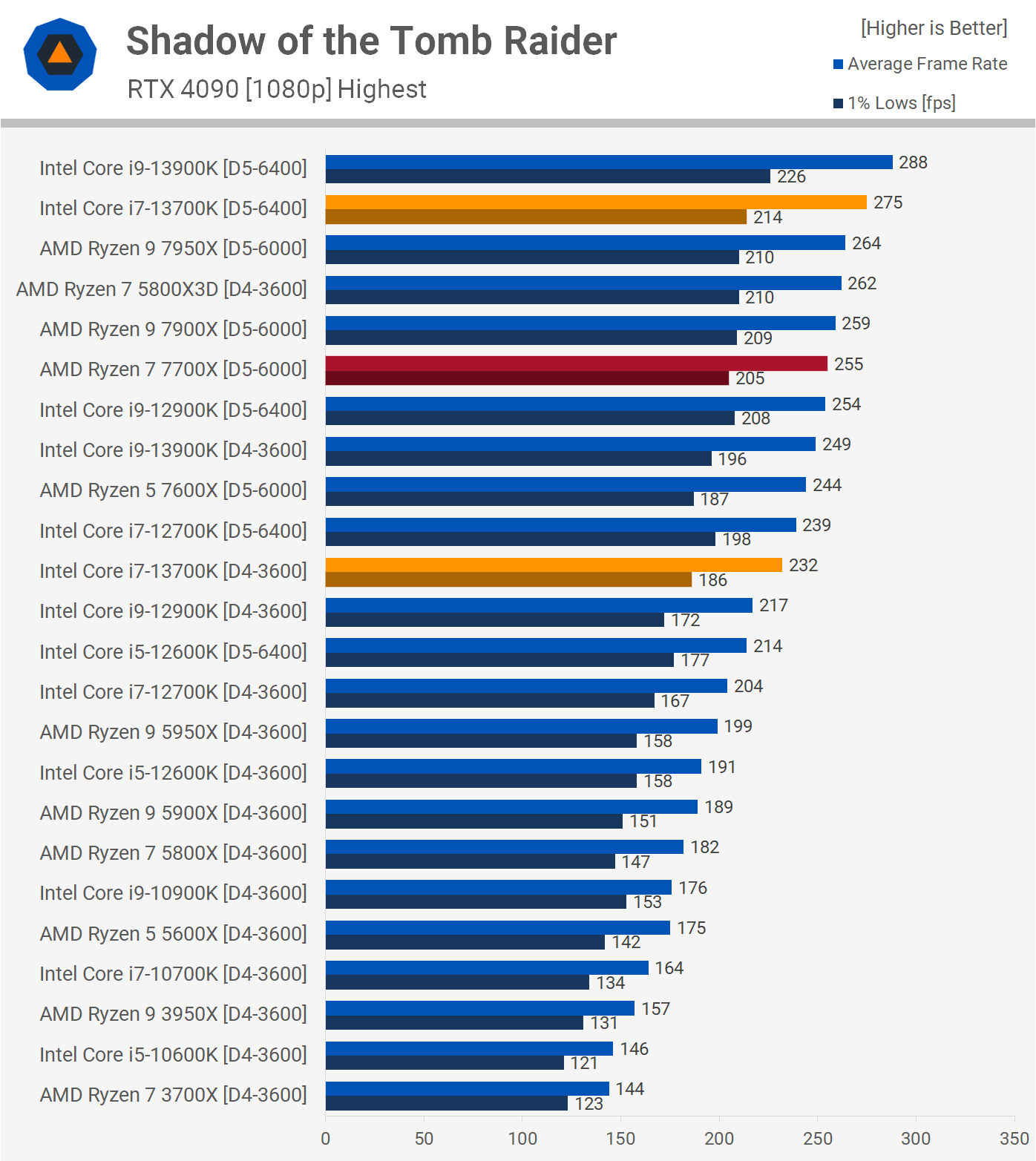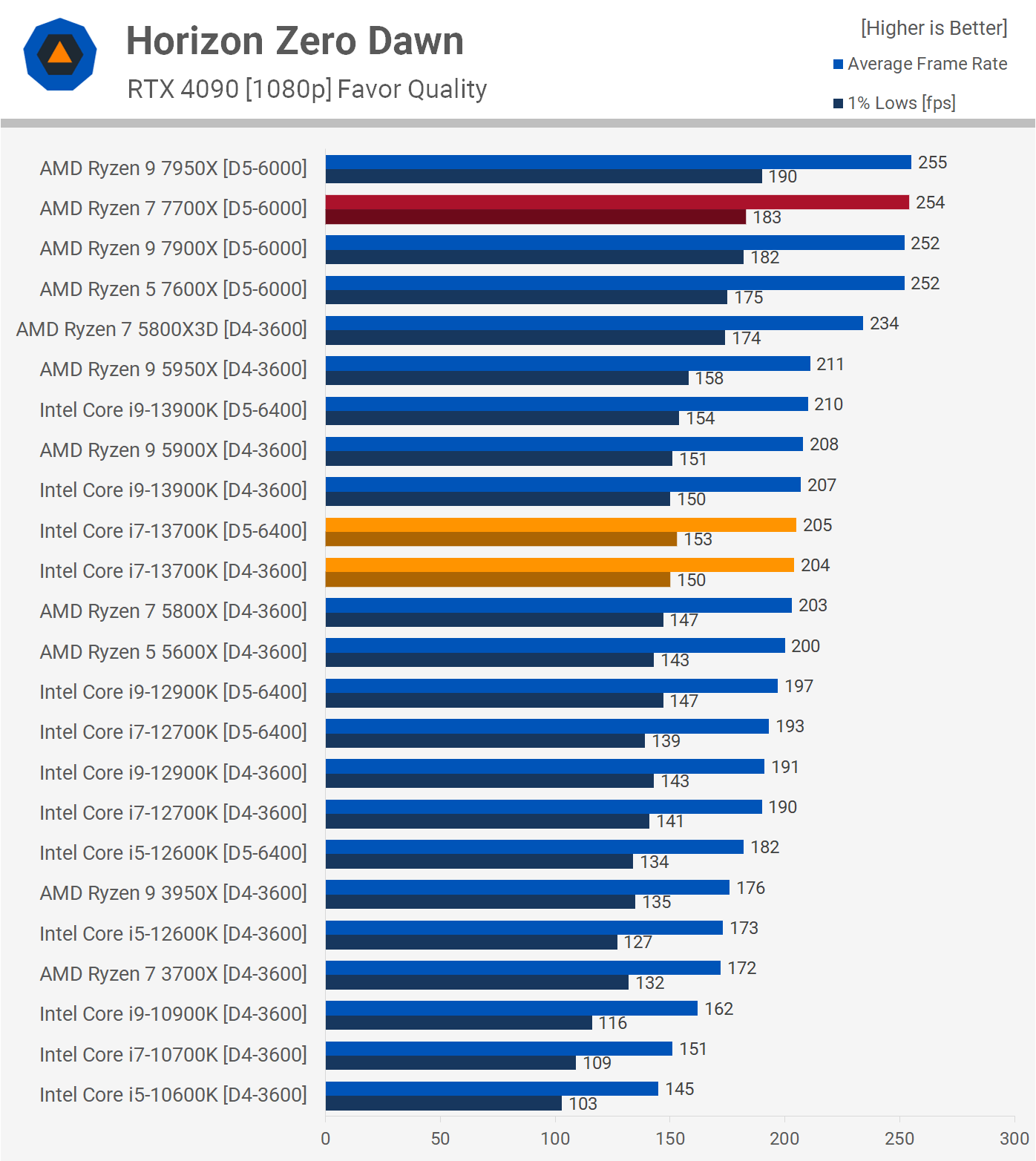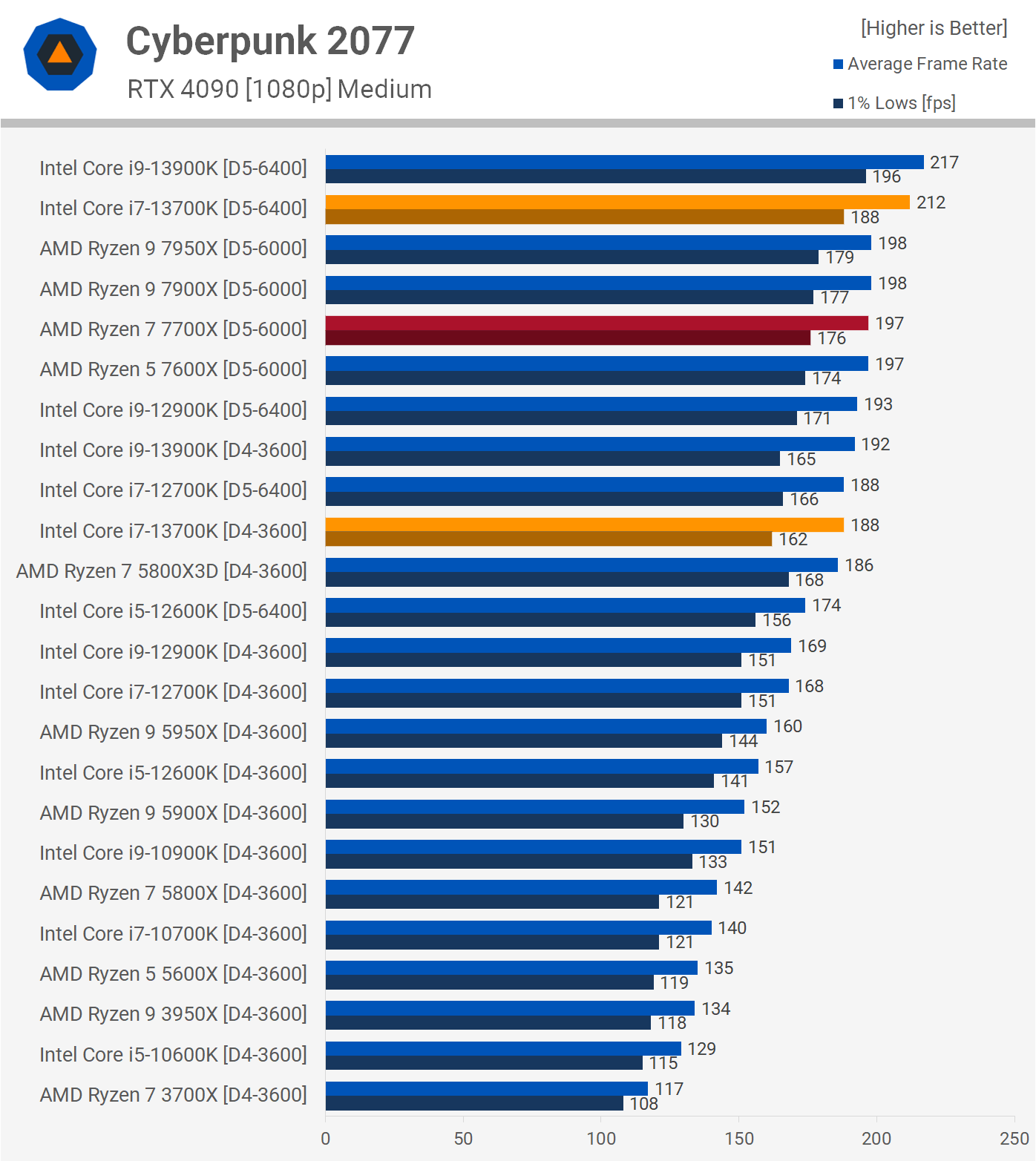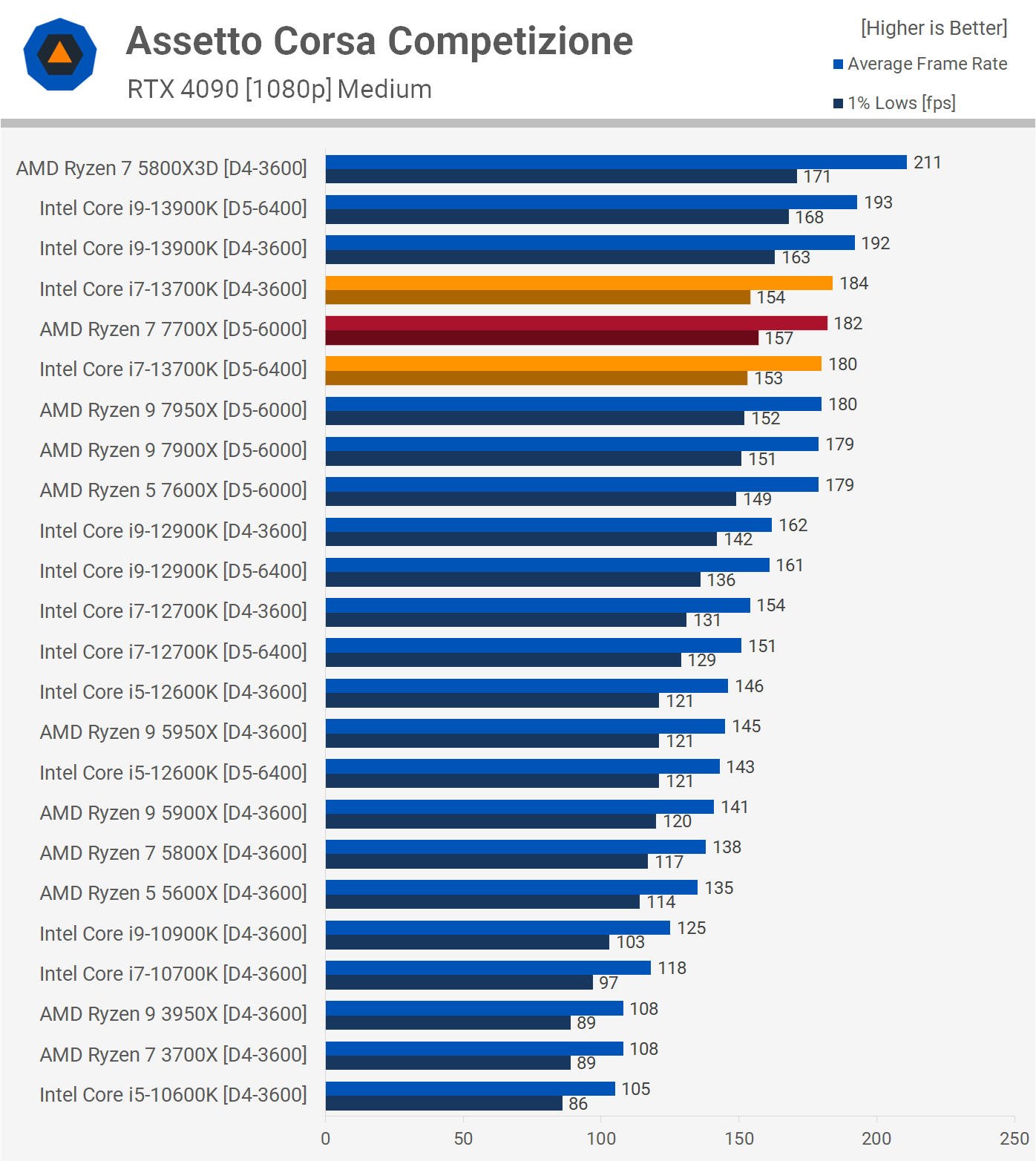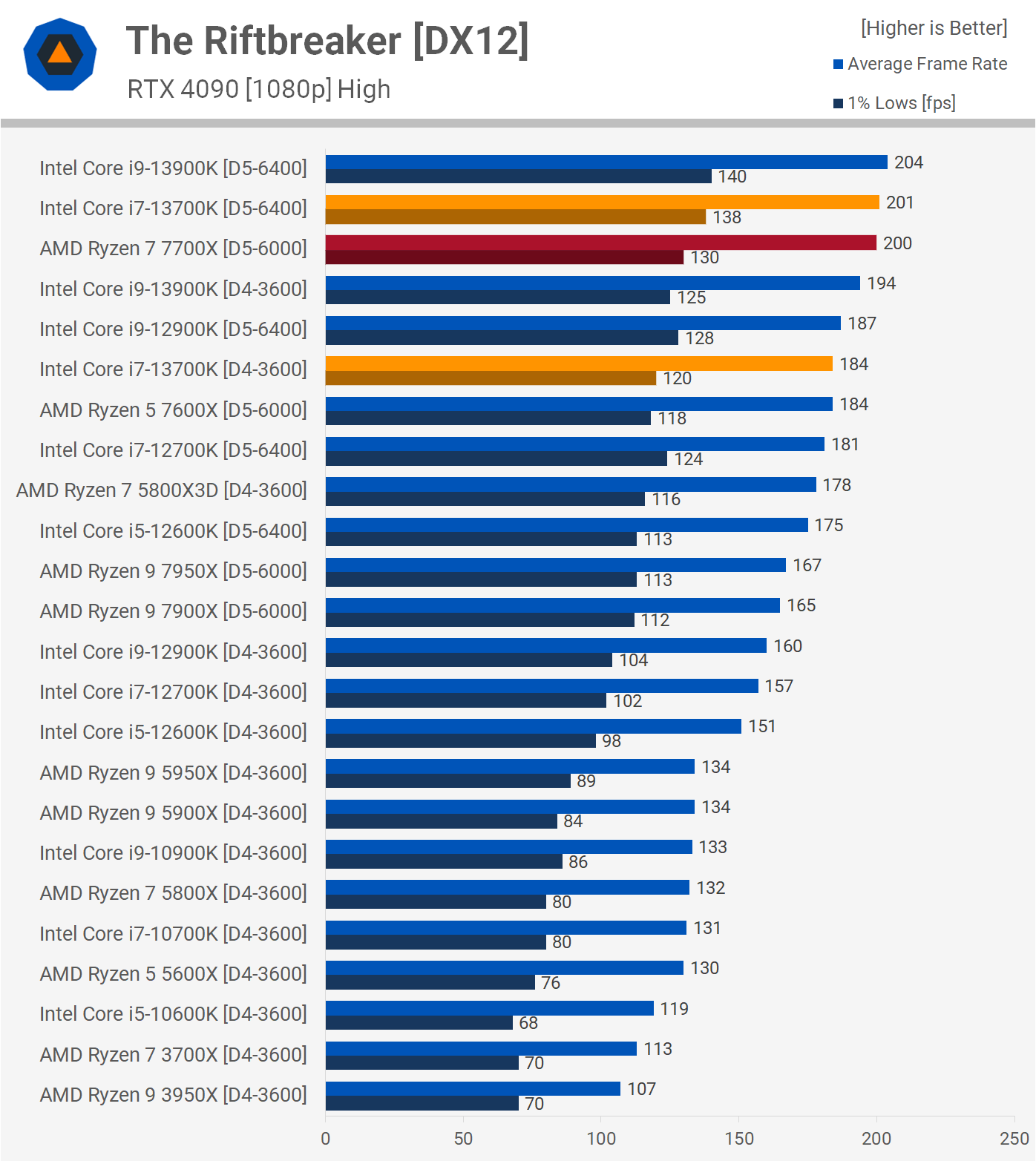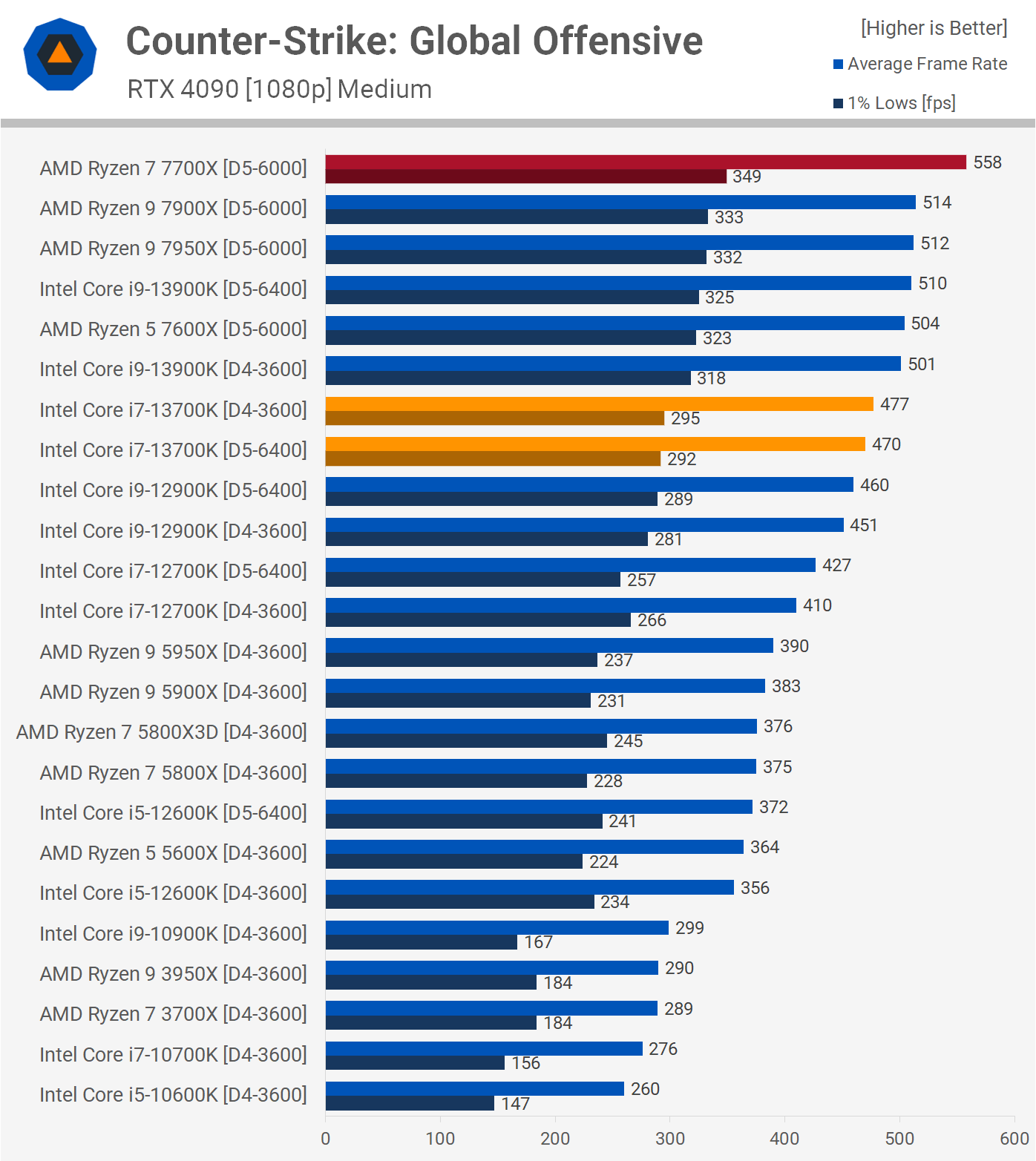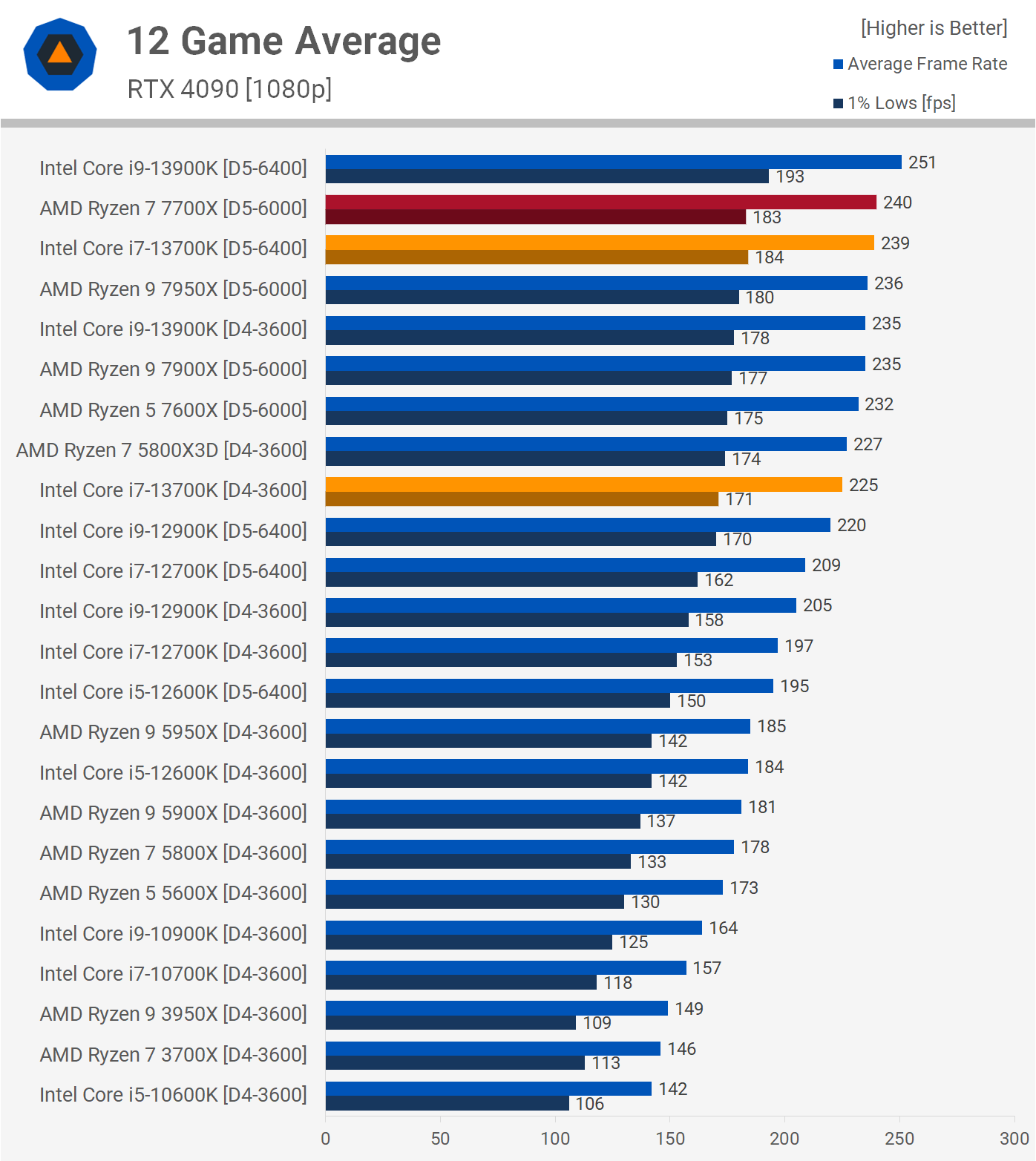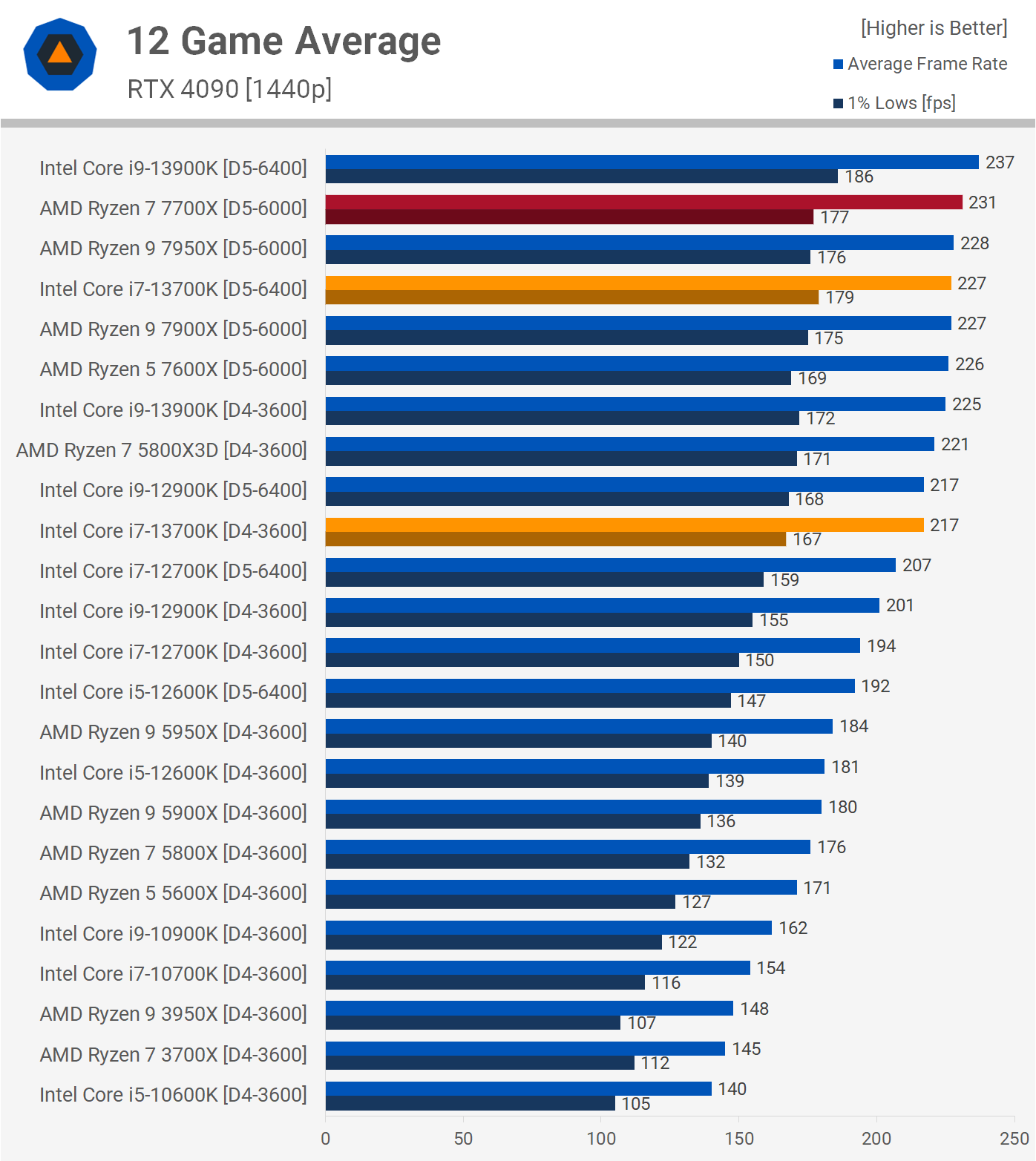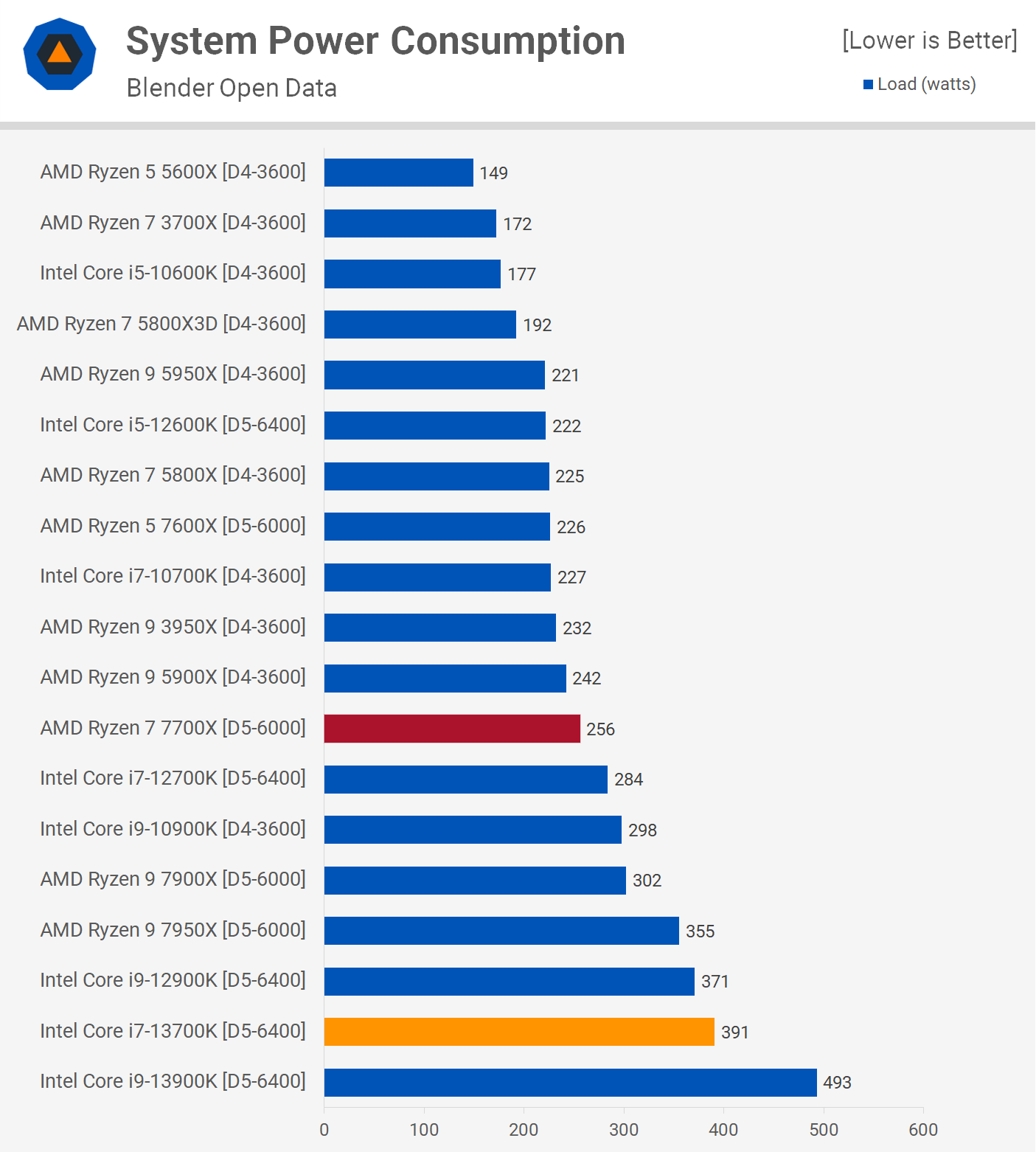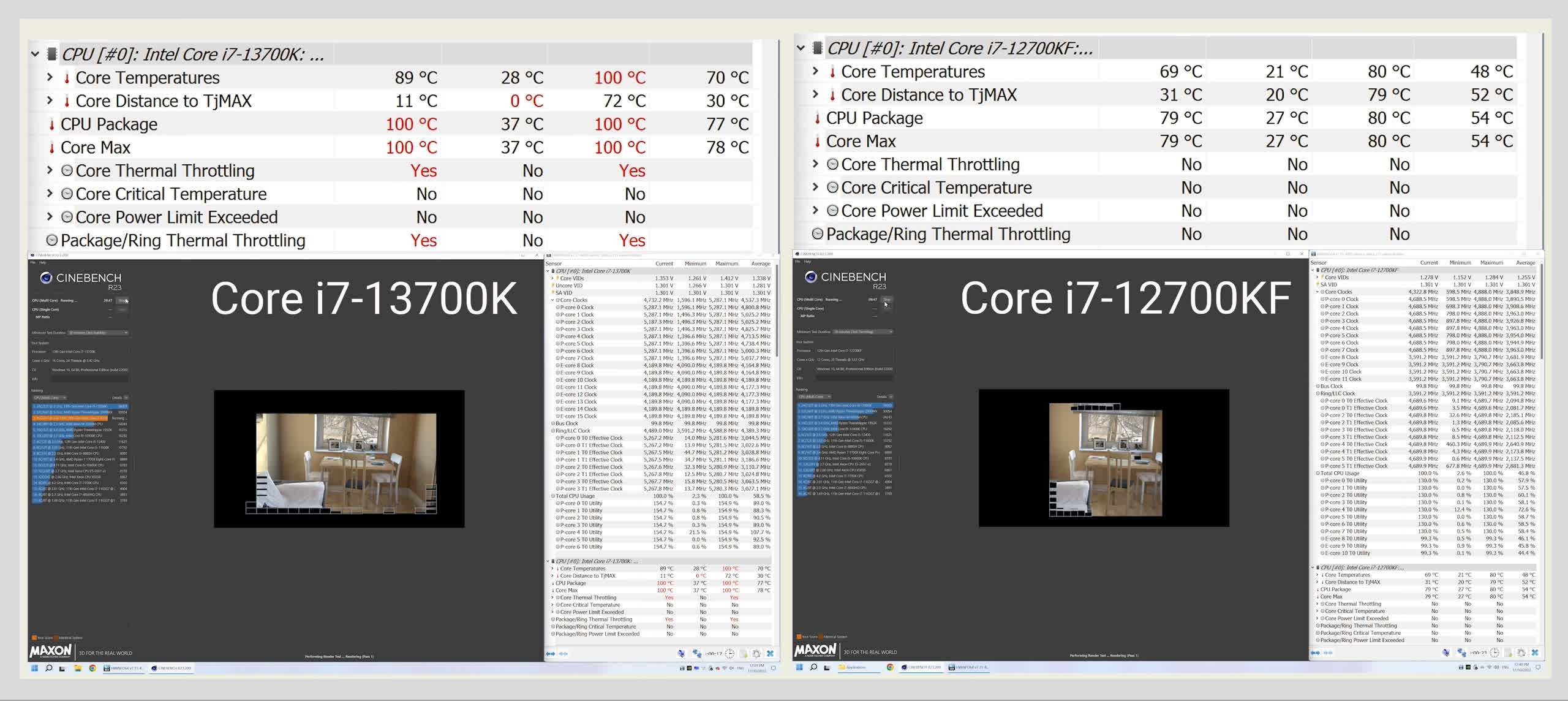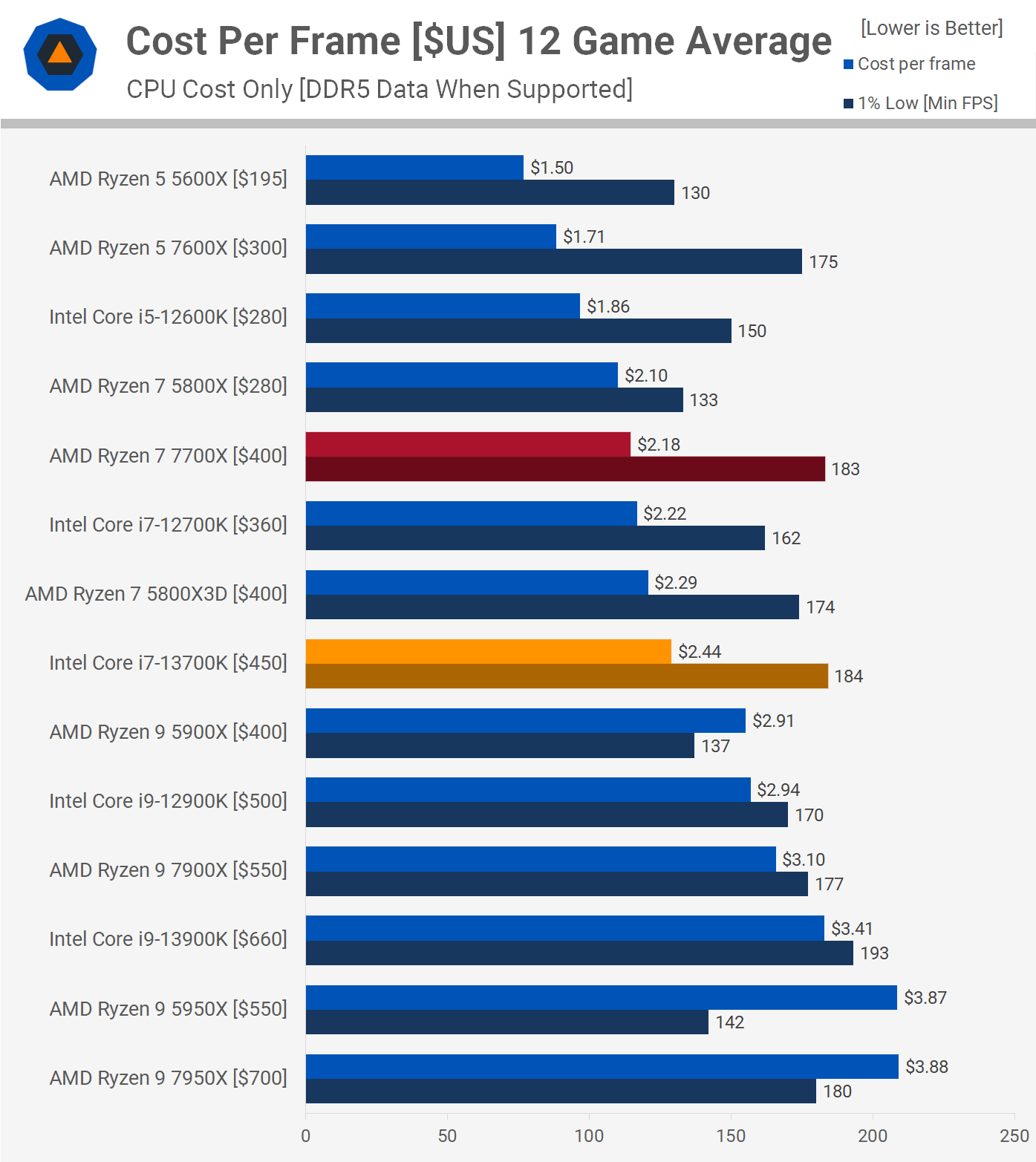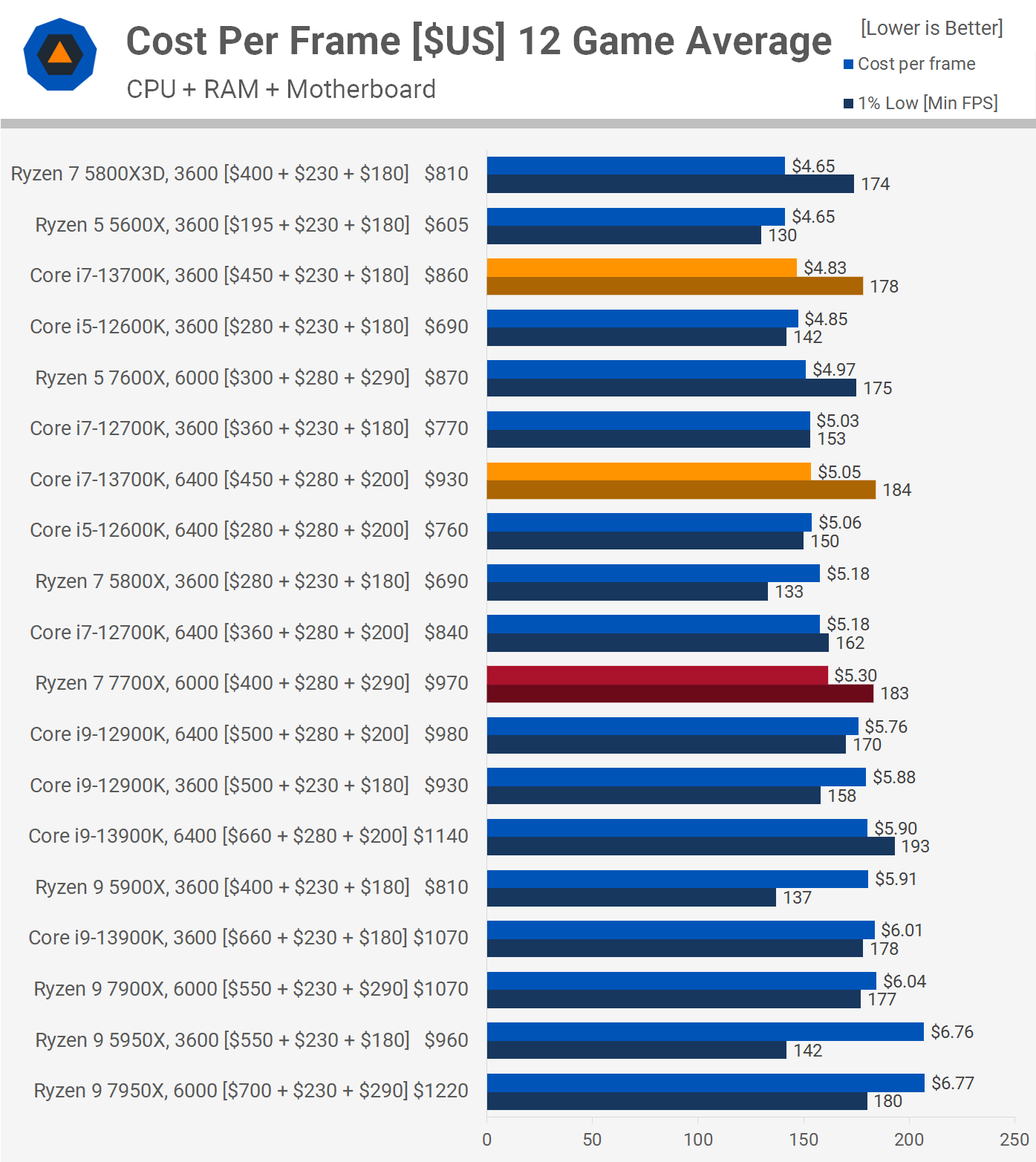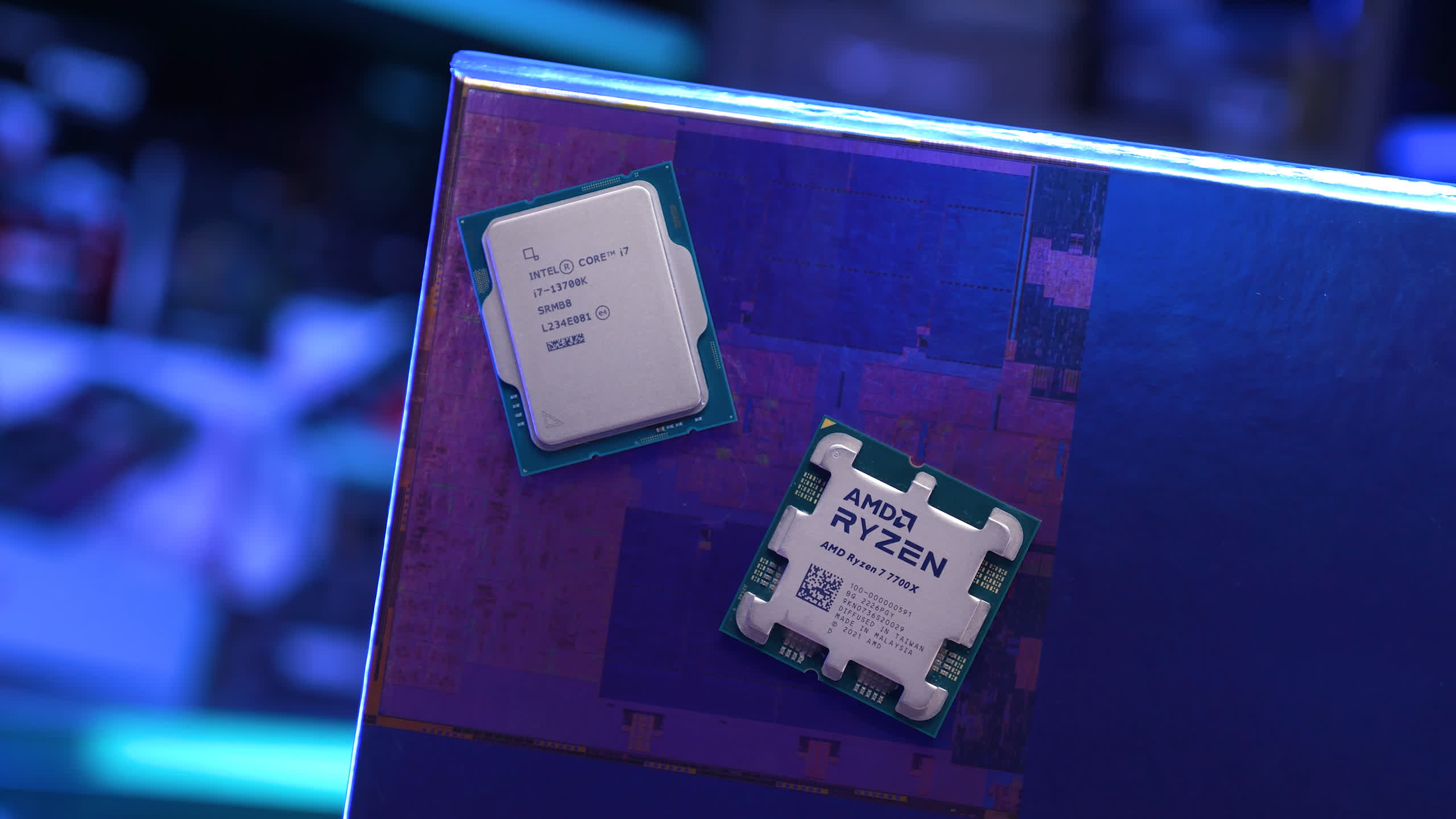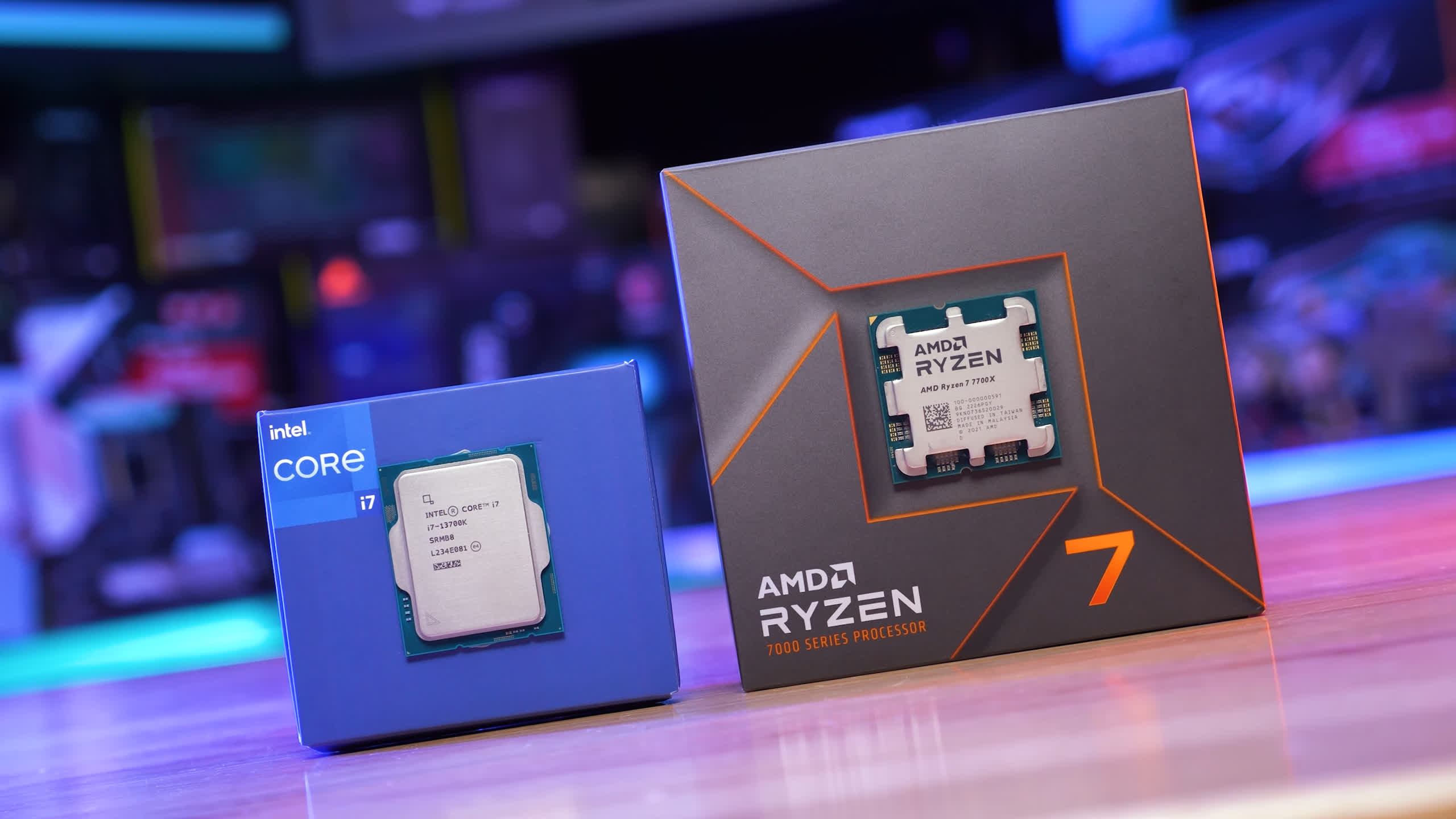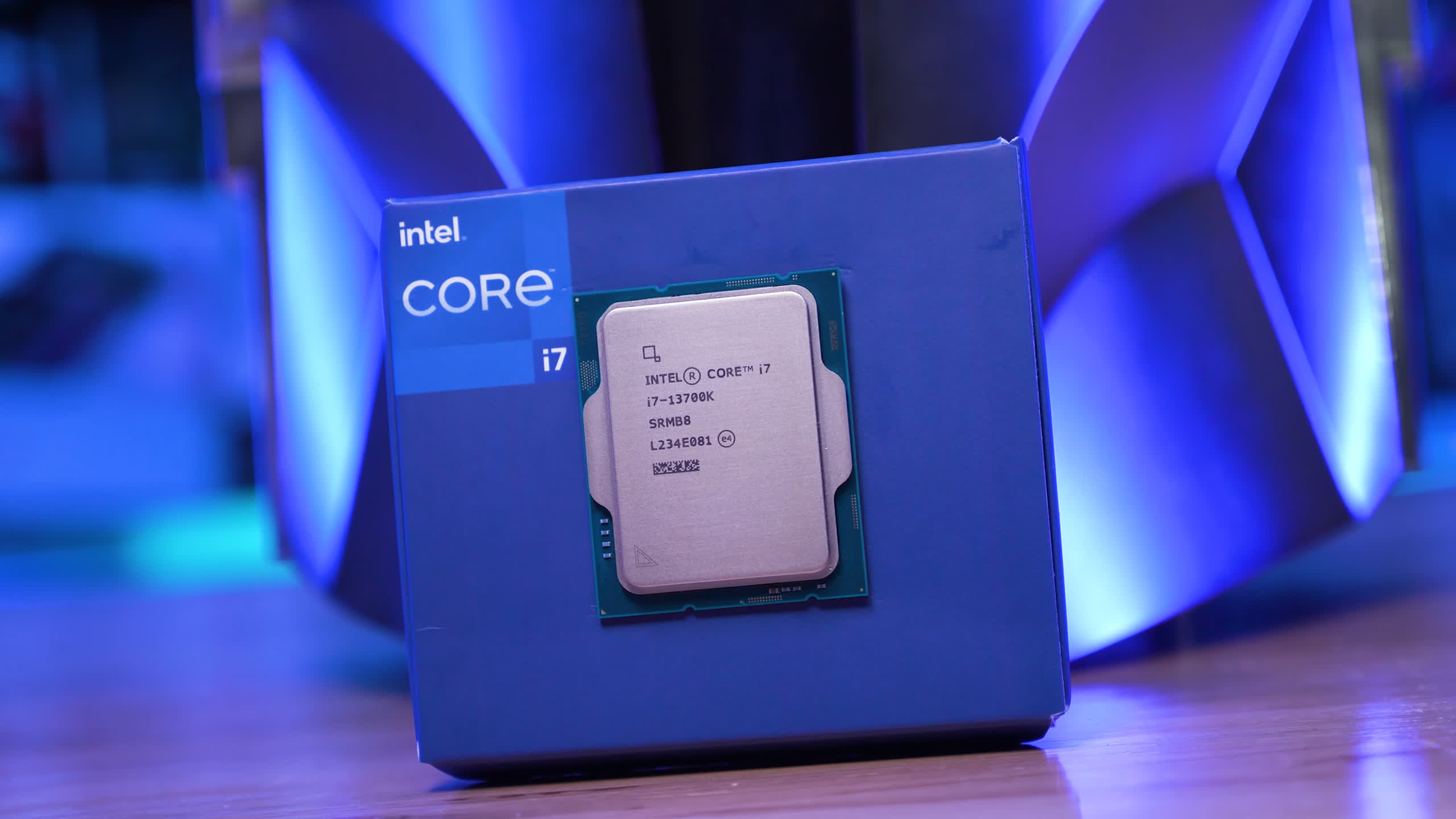Recently we took at look at Intel's new room heater, the Core i9-13900K, and although the performance was quite impressive, the power consumption wasn't and it made the Core i9 rather impractical when it came to heat output and difficulty to cool.
This was also the case with the previous 12900K model, though to a much lesser degree, and in that instance we were far more impressed with the Core i7 version, so will the i7-13700K also prove to be the more sensible choice? Well, let's find out...
In today's review we'll do a repeat and not just look at benchmark figures and raw performance, but also power consumption and operating temperatures, but first things first, let's talk about pricing and go over the specs.
Intel lists the Core i7-13700K for $420, though that's the per 1,000 unit price. In reality the retail price is closer to $450 at launch. That makes the 13700K $50 more expensive than the Ryzen 7 7700X, but $100 cheaper than the Ryzen 9 7900X, so the new Core i7 finds itself in an interesting position in terms of pricing.
As for specifications, there are noteworthy changes when compared to its predecessor. For example, the P-cores see an increase in L2 cache capacity per core from 1.25 MB for the 12th-gen to 2 MB, increasing the total L2 cache capacity to 16 MB. The E-cores see an even bigger upgrade, not only are there twice as many at 8 now, but the L2 cache has been upgraded from 2 MB per cluster to 4 MB for a total of 8 MB. The L3 cache capacity also sees a bump, going from 25 MB in the 12700K to 30 MB with the 13700K. All said and done, the 13700K packs 15% more cache than the 12700K.
The i7-13700K peak core clock speed has also increased by 8% from 5.0 GHz to 5.4 GHz, DDR5 memory support has been improved to DDR5-5600 for 13th-gen, although support for DDR4 memory is still present. The same 16 lanes of PCI Express 5.0 and 4 lanes of PCIe 4.0 from the CPU remain the same as the previous generation.
Also of note are power limits, or lack thereof. It's important to mention that Intel claims a 253 watt max turbo power, but that's not enforced and by Intel's own guidance, it's not meant to be enforced. This means all Z690 and Z790 motherboards run 12th and 13th-gen Core series processors without any power limits in place.
This has been an Intel "issue" for a long time now, and it's become an AMD issue as well. In our tests, Zen 4 CPUs ran far more efficiently when power limited, sacrificing only a small amount of performance for significantly lower power consumption, which results in lower operating temperatures. But this isn't the out of the box performance, as both AMD and Intel are gunning for top spot at the expense of efficiency. Anyway, we didn't power limit AMD Zen 4 CPUs, so we're not going to for Intel either, rather we'll focus on showing you what the default behavior is.
That's all the important specification changes and information, now let's go over the test system specs and get into the benchmarks. For the AM4 platform we've got a range of Zen 2 and Zen 3 CPUs included, all tested using 32GB of DDR4-3600 CL14 dual-rank memory on the MSI MPG X570S Carbon Max WiFi motherboard running the latest BIOS. The AM5 test system is based on the MSI MEG X670E ACE using 32GB of DDR5-6000 CL30 memory, and of course, all four Zen 4 CPUs have been included.
Also included for comparison are some Intel 10th-gen core processors including popular Core i5, i7 and i9 models. Then for the 12th and 13th-gen Core series processors we've tested using DDR4-3600 dual-rank CL14 memory and DDR5-6400 single-rank CL32 memory. All of this testing has been updated for this review, and benchmark data is fresh.
About two weeks ago we set out on a mission to upgrade all our CPU gaming data using the Nvidia GeForce RTX 4090, and this is the result. We're using Windows 11 and resizable bar was enabled for all configurations. For this review we've tested at 1080p and 1440p, so there's a lot to go over.
Clock Speeds
Before we dive into the blue bar graphs, here's a look at clock behavior in Cinebench R23. After an hour of load testing the 13700K maintained an all-core frequency of 5.2 GHz for the P-cores and 4.1GHz for the E-cores. This frequency was sustained using the MSI CoreLiquid S360 360mm AIO installed inside the MSI Prospect 700R case.
Then for single core workloads, the 13700K appeared to maintain a clock frequency of 5.3 GHz under load, so the advertised 5.4 GHz frequency wasn't achieved in this test, though HWinfo did report clocks as high as 5.4 GHz, but it wasn't achieved in this test.
Application Benchmarks
Starting with Cinebench R23 multi-core results we see that the 13700K is good for a score of 29045 pts after a 10 minute loop, placing it roughly on par with the Ryzen 9 7900X. This is a stellar result considering this is a $100 less expensive CPU.
Then when compared to the 7700X, we're looking at a 46% performance improvement for the 13700K, so it looks like the Core i7 easily has the Ryzen 7's number for core-heavy productivity workloads.
The single core performance of those P-cores is also very good as the 13700K managed to match the 7950X, making it a little faster than the 7800X and 5% faster than the 7700X. When compared to the 13900K it was 6% slower, but that's mostly down to the fact that it doesn't clock quite as aggressively, and it has a little less L3 cache.
Like the 13900K, the 13700K was very strong in the 7-Zip File Manager compression test, comfortably beating the 7900X by an 8% margin and the 7700X by a massive 30% margin. It might have been 17% slower than the 13900K, but it was almost 20% faster than the 12700K, so a nice generational improvement there.
The decompression performance isn't as impressive, but even so it still knocked off the 7700X by a comfortable 17% margin, though it was 21% slower than the 7900X and 27% slower than the 13900K.
Moving on to Blender Open Data results, we find that the 13700K is able to match the previous generation Ryzen 9 5950X, making it just 9% slower than the 7900X, but a massive 36% faster than the 7700X. So again we see that the new Core i7 processor finds itself in a really nice place when it comes to all-core performance.
It also blitzed the Corona benchmark in 48 seconds to basically match the 7900X and 5950X, making it 25% slower than the 13900K, but 48% faster than the 7700X.
Next up we have the Premiere Pro results and here the 13700K matched the 13900K along with the 7700X, so not a bad result, but not a streller one either. Basically it was 6% slower than the 7900X, but almost 40% faster than its predecessor, the 12700K.
Where the 13700K does excel is in the single core focused Photoshop benchmark, scoring 1544 pts, making it 4% faster than the 7900X and just a percent slower than the 7700X, so there's basically nothing in it here and all current generation processors performed really well.
Like Photoshop, After Effects also tends to favor CPUs with strong single core performance, and here the 13700K again does very well, edging out Intel's previous generation flagship to beat the 7900X by a slim 5% margin.
The last application benchmark that we're going to look at is code compilation performance and here the 13700K again does very well, almost matching the 7900X as it completed the workload in 3335 seconds. This meant it was 12% faster than the 7700X and 9% faster than the 12700K.
Gaming Benchmarks
Time for the gaming benchmarks and we'll start with Factorio. Here the 13700K does very well, almost matching the 12900K while outplacing the 7900X and 7700X by a slim margin. It was also just 9% slower than the 13900K, so overall a good result here.
Moving on to Watch Dogs: Legion we see that the 13700K when armed with DDR5 memory is on par with the 5800X3D, making it a mere 3% slower than the 13900K, but 7% faster than the 7900X and 7700X. It was also 23% faster running DDR5-6400 opposed to DDR4-3600. Also please note that I'm going to skip the 1440 data for this review and instead just show the average results as they aren't drastically different to what we see at 1080p.
Next we have Rainbow Six Extraction and here the 13700K performed very similarly to the 13900K, delivering over 450 fps at 1080p. This placed it roughly on par with the 7900X and just 5% behind the 7700X, though it was 14% slower when comparing 1% lows. Either way though all Zen 4 and Raptop Lake CPUs were mighty fast here.
Hitman 3 does favor Zen 4 CPUs, so the 7900X can be seen delivering 9% more performance than the 13700K, or 16% more when limiting the Core i7 processor to DDR4 memory. Still you are getting 12900K-like performance from the 13700K here, so it's hardly slow.
The 13700K had no issue beating the Zen 4 competition in Far Cry 6, delivering 189 fps with DDR5 and 193 fps with DDR4, making it up to 6% faster than the 7700X and 7900X here. It was also only around 4-6% slower than the 13900K.
The 13700K was also impressive in F1 22, edging out the 5800X3D when limited to DDR4 memory. Then when paired with DDR5 it was 13% faster than the 7900X and 7700X, averaging 384 fps making it just 5% slower than the 13900K.
As seen previously the 13900K was extremely impressive in Spider-Man Remastered, achieving 141 fps on average. The 13700K isn't quite as impressive but still it did manage to come in second, edging out AMD's Zen 4 range by a 3-4% margin, not exactly a noteworthy margin but it's yet another example of the new Core i7 processor demonstrating strong gaming performance.
Here we have another example in Shadow of the Tomb Raider of the 13700K beating AMD's Zen 4 lineup, this time beating the 7900X by a 6% margin hitting 275 fps on average. We did see a 9% decline in performance using low latency DDR4-3600, so for the best results the 12700K will require DDR5 memory.
Horizon Zero Dawn is a bit of an outlier as here the Zen 4 CPUs perform exceptionally well, pushing past the 5800X3D by a reasonable margin. The 13700K was hardly slow here with 207 fps on average, but that did make it almost 20% slower than the 7700X.
The 13700K is back on top in Cyberpunk 2077, spitting out 212 fps on average to make it 7% faster than the 7900X and 9% faster than the 7700X. That said this level of performance does require DDR5 memory as it was 11% slower when using our DDR4 configuration.
Although the 13700K couldn't catch the 5800X3D in ACC, it still did very well overall with 184 fps, allowing it to roughly match the 7700X and 7900X, while trailing the 13900K by a mere 5% margin.
The 13700K also matched the 7700X in The Riftbreaker with 201 fps on average, though I should note that 1% lows were improved by 6%. AMD's dual CCD CPUs also suffer from a performance related bug in this title, which is why the 7900X is so much slower. Disabling a CCD resolves this, but then you only have half as many cores, so that kind of defeats the purpose of that part.
The last game we're going to look at is Counter-Strike: Global Offensive, where the 13700K isn't particularly impressive, despite pumping out almost 500 fps on average. Still, 470 fps for the DDR5 configuration meant it was 9% slower than the 7900X and 16% slower than the 7700X. So one of the weaker gaming results for the new Core i7 processor.
12 Game Average
Here's the 12 game average using the RTX 4090 and as you can see the 13700K using DDR5 memory is comparable to the 7700X, trading blows in most titles. This also means that the 13700K is just 2% faster than the 7900X on average, so again nothing in it.
Using low latency DDR4-3600 saw the new Core i7 match the 5800X3D, coming in just 3% slower than the 7600X. Impressively, it did still manage to beat the 12900K which was paired with DDR5 memory. With both CPUs running DDR5 memory the 13700K was 9% faster and 14% faster than the 12700K.
The slightly more GPU limited 1440p data sees the 13700K armed with DDR5 memory allowing for 227 fps on average which placed it alongside the 7700X and 7900X. Here it was just 4% slower than the 13900K, but 5% faster than the 12900K and 10% faster than the 12700K. Overall a good result.
Power Consumption
The Core i7-13700K looks a little less impressive when looking at core power consumption and please note these are total system power figures. The 13700K is a 12900K but with the Raptor Lake architectural improvements, but in terms of power usage it's basically a 12900K. This isn't ideal as we were never impressed with the power and thermals of the 12900K, and instead much preferred the 12700K, which as you can see here consumed almost 100 watts less.
Still, the 13700K is far more manageable than the new 13900K, reducing total system consumption by 100 watts. Out of the box, power efficiency of the 13700K isn't great, pushing total system consumption roughly 30% higher than the 7900X, while delivering almost 10% less performance.
Cooling Performance
Using the MSI CoreLiquid S360 360mm liquid cooler, the Core i7-13700K peaked at TjMAX after less than 3 minutes of all-core load, so 100c. That said, despite running extremely hot, this only reduced the all-core frequency by 100 MHz, from 5.3 GHz at the start of our testing to 5.2 GHz once at TjMAX. So while annoying, it doesn't have a significant impact on performance.
Although the 13700K's out of the box behavior is a little more manageable than the 13900K, it's still less than ideal hitting the 100c TjMAX after just a few minutes of a basic all-core workload.
Above is a comparison with the 12700K, a CPU that we very much liked and often recommended over the AMD Zen 3 options and still believe is a viable alternative to Zen 4. Under full load for an hour the 12700K is still at least 20c from TjMAX with a peak operating temperature of just 80c and a typical operating temperature of 78c. Power consumption as we saw is also much more manageable, it's a shame we're not seeing this with the 13700K.
Cost vs. Performance
For the cost per frame analysis we can see that when just accounting for the cost of the CPU, the 13700K is significantly better value than the 13900K and 7900X, when it comes to gaming performance. We're looking at an almost 30% reduction in cost per frame for the 13700K when compared to the 13900K, and a 21% reduction when compared to the 7900X. That said it was 12% more costly than the 7700X, but of course, the 7700X has some issues when it comes to platform costs which we'll look at now.
Once we factor in the cost of a decent motherboard and memory, the 13700K looks a lot better, especially relative to the 7700X. The DDR5 configuration was 5% less per frame, saving you $40 which isn't a big difference. The lower operating temperatures of the 7700X, lower power consumption, and more future-proof platform can certainly cover off that small difference.
The real value is seen when opting for DDR4 memory and, while this can result in some performance loss in some titles, it does improve the value aspect of the 13700K, and it's possible to achieve a similar level of performance with much cheaper DDR4 memory than what we used.
All that said, if you're looking at building a new high-end gaming PC and want to save as much money as possible, we still feel the 5800X3D is your best bet.
The Sensible Option = Intel's Best
The Core i7-13700K is a much more practical CPU when compared to the 13900K, behaving more like the 12900K in terms of power and thermals. We're certainly much more impressed with what this Core i7 part has to offer, and we'd seriously consider it if you're building a brand new gaming PC.
For productivity workloads, the i7-13700K typically traded blows with the 7900X and proved far more capable than the 7700X, so it's a very good value productivity CPU overall. Depending on the particular applications you are running, AMD or Intel may have the upper hand, but in general it's hard to go wrong with the 13700K when it comes to productivity. The only caveat being that the more expensive 7900X generally delivers the same or better performance while consuming considerably less power.
For pure gaming, the 13700K and 7700X are neck and neck. If you do a bit of productivity work as well as gaming, then the Core i7-13700K is the better all rounder. The 13700K will use more power and run a little hotter while gaming, but neither should be an issue, it can be paired with cheaper DDR4 memory on more affordable Z690 motherboards, so that's a big win in the value department.
The Ryzen 7700X, on the other hand, is more expensive when factoring in platform costs, but it's also on what is arguably a better platform with at least two future Ryzen generations supported, so your investment should provide a better upgrade path.
As it turns out, when it comes to gaming, the takeaway is you now have loads of great options to choose from. The 13700K delivers across the board, while the 7700X has a few platform advantages, or there's AM4 that still offers loads of value with parts such as the 5800X3D. There's also the expectation that AMD will release a 3D V-Cache version of Zen 4 early next year, so it might pay to hold off for another 3 months. Don't expect those CPUs to be particularly affordable, but then we are talking about high-end gaming, so that's par for the course.
Bottom line, the Core i7-13700K is certainly a more impressive offering than what we saw from the Core i9, so we're keen to check out the Core i5-13600K next. We were huge fans of the 12600K, so fingers crossed the 13600K can live up to expectations.

